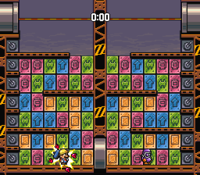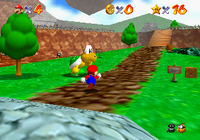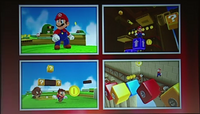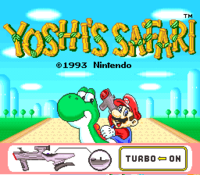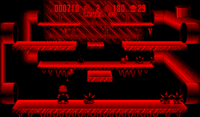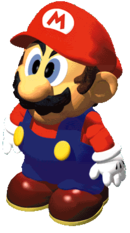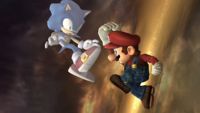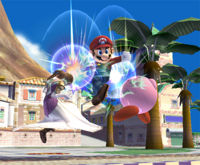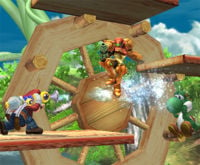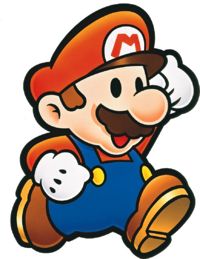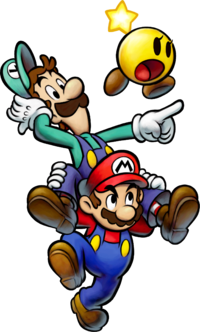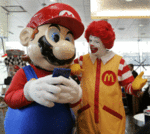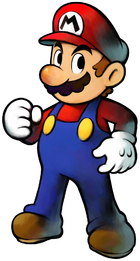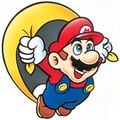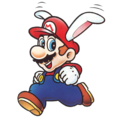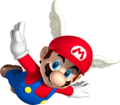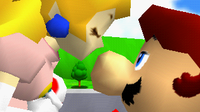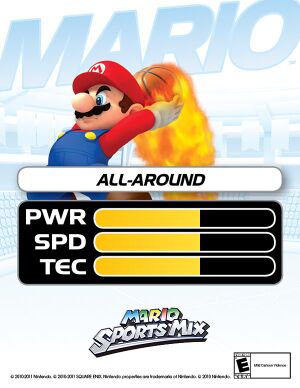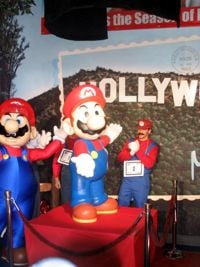Mario: Difference between revisions
| Line 19: | Line 19: | ||
==History== | ==History== | ||
===''Donkey Kong'' series=== | ===''Donkey Kong'' series=== | ||
====''Donkey Kong''==== | |||
[[File:EveryoneDKAC.png|thumb|right|Mario (Jumpman) in ''Donkey Kong''.]] | [[File:EveryoneDKAC.png|thumb|right|Mario (Jumpman) in ''Donkey Kong''.]] | ||
In ''Donkey Kong'', released in 1981{{refneeded}}, Mario is a construction worker with the mission to rescue his girlfriend [[Pauline]] from the clutches of the giant ape [[Donkey Kong]], who abducted her to a construction site. With the one button of the game, the player can make Mario jump over obstacles. Mario also uses [[hammer]]s as an item. Jumping can only be used to jump over obstacles, not to destroy them as is a prominent feature in later games. | In ''Donkey Kong'', released in 1981{{refneeded}}, Mario is a construction worker with the mission to rescue his girlfriend [[Pauline]] from the clutches of the giant ape [[Donkey Kong]], who abducted her to a construction site. With the one button of the game, the player can make Mario jump over obstacles. Mario also uses [[hammer]]s as an item. Jumping can only be used to jump over obstacles, not to destroy them as is a prominent feature in later games. | ||
====''Donkey Kong Jr.''==== | |||
In ''[[Donkey Kong Jr. (game)|Donkey Kong Jr.]]'', Mario appears as the antagonist, having captured Donkey Kong and holding the ape in a cage. Mario opposes the protagonist [[Donkey Kong Jr.]] who rescues his father in the end. Another game depicting Mario as the tamer of Donkey Kong is the [[Game & Watch]] title ''[[Donkey Kong Circus]]'', in which Mario only appears in the background. | In ''[[Donkey Kong Jr. (game)|Donkey Kong Jr.]]'', Mario appears as the antagonist, having captured Donkey Kong and holding the ape in a cage. Mario opposes the protagonist [[Donkey Kong Jr.]] who rescues his father in the end. Another game depicting Mario as the tamer of Donkey Kong is the [[Game & Watch]] title ''[[Donkey Kong Circus]]'', in which Mario only appears in the background. | ||
| Line 122: | Line 124: | ||
====''Super Mario Sunshine''==== | ====''Super Mario Sunshine''==== | ||
[[File:Plumbersunshine.jpg|thumb|120px|Mario with | [[File:Plumbersunshine.jpg|thumb|120px|Mario with F.L.U.D.D. on his back in ''Super Mario Sunshine''.]] | ||
''[[Super Mario Sunshine]]'' featured a more advanced introduction and storyline background than usual in games of the ''Super Mario'' series. Mario, Peach and [[Toadsworth]] travelled to the tropical island of [[Isle Delfino]] to have a vacation. Upon arriving, Mario is immediately confronted with charges for crimes commited by a shadowy figure similar to him in appearance, [[Shadow Mario]], who has covered large areas of the island in [[Graffiti]]. Mario is sentenced to clean the entire island off the dirt, and is given the device [[F.L.U.D.D.|FLUDD]] to do so. | ''[[Super Mario Sunshine]]'' featured a more advanced introduction and storyline background than usual in games of the ''Super Mario'' series. Mario, Peach and [[Toadsworth]] travelled to the tropical island of [[Isle Delfino]] to have a vacation. Upon arriving, Mario is immediately confronted with charges for crimes commited by a shadowy figure similar to him in appearance, [[Shadow Mario]], who has covered large areas of the island in [[Graffiti]]. Mario is sentenced to clean the entire island off the dirt, and is given the device [[F.L.U.D.D.|FLUDD]] to do so. | ||
| Line 139: | Line 141: | ||
====''Super Mario Galaxy''==== | ====''Super Mario Galaxy''==== | ||
[[File:BStar.PNG|thumb|Mario attracted by a [[Pull Star]].]] | [[File:BStar.PNG|thumb|Mario attracted by a [[Pull Star]] in ''Super Mario Galaxy''.]] | ||
''[[Super Mario Galaxy]]'' brought back most of the jumping mechanics present in ''Super Mario 64'' missing in ''Super Mario Sunshine''. The game also added new powers, including the [[Star Spin]] and the Wii pointer, which can be controlled independently from Mario. The Wii pointer allows players to shoot enemies or grab [[Star Piece]]s without controlling Mario, although Mario is repeatedly reminded of these functions by in-game characters, so it is debatable whether using [[Pull Star]]s or collecting Star Pieces from afar can be considered a power of Mario or not. | ''[[Super Mario Galaxy]]'' brought back most of the jumping mechanics present in ''Super Mario 64'' missing in ''Super Mario Sunshine''. The game also added new powers, including the [[Star Spin]] and the Wii pointer, which can be controlled independently from Mario. The Wii pointer allows players to shoot enemies or grab [[Star Piece]]s without controlling Mario, although Mario is repeatedly reminded of these functions by in-game characters, so it is debatable whether using [[Pull Star]]s or collecting Star Pieces from afar can be considered a power of Mario or not. | ||
| Line 150: | Line 152: | ||
====''Super Mario'' (Nintendo 3DS)==== | ====''Super Mario'' (Nintendo 3DS)==== | ||
[[File:3DMARIO.png|thumb| | [[File:3DMARIO.png|thumb|left|Early screenshots from ''Super Mario'' for the 3DS.]] | ||
Mario is set to appear in a ''[[Super Mario (Nintendo 3DS)|Super Mario]]'' for the [[Nintendo 3DS]]. Screenshots suggest that the game is based on either ''Super Mario 64'' or ''Super Mario Galaxy'', so Mario's moveset might be drawn from those two games. It also shows the first use of [[Small Mario]] in a 3D game. | Mario is set to appear in a ''[[Super Mario (Nintendo 3DS)|Super Mario]]'' for the [[Nintendo 3DS]]. Screenshots suggest that the game is based on either ''Super Mario 64'' or ''Super Mario Galaxy'', so Mario's moveset might be drawn from those two games. It also shows the first use of [[Small Mario]] in a 3D game. | ||
| Line 161: | Line 163: | ||
<br clear=all> | <br clear=all> | ||
=== | ===Appearances in Other Media=== | ||
{{rewrite}} | {{rewrite}} | ||
====''The Super Mario Bros. Super Show!''==== | ====''The Super Mario Bros. Super Show!''==== | ||
| Line 182: | Line 184: | ||
The ''[[Super Mario World (television series)]]'' is a continuation of the previous series, ''The Adventures of Super Mario Bros. 3''. This time, the episodes focuses loosely on the video game ''[[Super Mario World]]'' with added characters, the most prominent, [[Yoshi]], the [[Cave People]], and [[Oogtar]]. Mario appears in every episode of the ''Super Mario World'' television series as one of the main protagonists. | The ''[[Super Mario World (television series)]]'' is a continuation of the previous series, ''The Adventures of Super Mario Bros. 3''. This time, the episodes focuses loosely on the video game ''[[Super Mario World]]'' with added characters, the most prominent, [[Yoshi]], the [[Cave People]], and [[Oogtar]]. Mario appears in every episode of the ''Super Mario World'' television series as one of the main protagonists. | ||
===''Mario is Missing!''=== | |||
The 1992 game ''[[Mario is Missing!]]'' was the first game in the ''Mario Discovery Series''<ref>An [http://www.nintendoage.com/forum/messageview.cfm?catid=5&threadid=39370 alternate box art] of ''Mario is Missing!'' sported the "Mario Discovery Series" symbol.</ref> of Educational Games and brought the ''Mario'' characters back to the [[Real World]]. When hearing of Bowser's plan to flood the Earth by melting [[Antarctica]]'s ice with hair dryers, Mario, Luigi and Yoshi head to Bowser's castle in the Antarctic. Mario is captured, although the exact circumstances of his capture vary greatly between the systems the game appeared on. | The 1992 game ''[[Mario is Missing!]]'' was the first game in the ''Mario Discovery Series''<ref>An [http://www.nintendoage.com/forum/messageview.cfm?catid=5&threadid=39370 alternate box art] of ''Mario is Missing!'' sported the "Mario Discovery Series" symbol.</ref> of Educational Games and brought the ''Mario'' characters back to the [[Real World]]. When hearing of Bowser's plan to flood the Earth by melting [[Antarctica]]'s ice with hair dryers, Mario, Luigi and Yoshi head to Bowser's castle in the Antarctic. Mario is captured, although the exact circumstances of his capture vary greatly between the systems the game appeared on. | ||
| Line 190: | Line 191: | ||
The game centers around Luigi, who rescues Mario from Bowser in the end. | The game centers around Luigi, who rescues Mario from Bowser in the end. | ||
===''Mario's Time Machine''=== | |||
In ''[[Mario's Time Machine]]'', Bowser uses a time machine to steal various artifacts from different time periods of human history in order to display them at his museum. Mario goes on a mission to return all objects of Bowser's museum to their original time periods in order to prevent history from being altered. Additionally, Mario had to rescue Yoshi from Bowser in the NES version of the game. ''Mario's Time Machine'' is one of the few games in which Mario talks. | In ''[[Mario's Time Machine]]'', Bowser uses a time machine to steal various artifacts from different time periods of human history in order to display them at his museum. Mario goes on a mission to return all objects of Bowser's museum to their original time periods in order to prevent history from being altered. Additionally, Mario had to rescue Yoshi from Bowser in the NES version of the game. ''Mario's Time Machine'' is one of the few games in which Mario talks. | ||
| Line 245: | Line 246: | ||
[[File:MarioplumberParty3.jpg|thumb|100px|Mario as he appears in ''Mario Party 3'']] | [[File:MarioplumberParty3.jpg|thumb|100px|Mario as he appears in ''Mario Party 3'']] | ||
Mario is always represented by his trademark red color. The mini-games test Mario's luck, skill, and endurance and reward him with coins. In the first three Mario Party games, Mario aimed to become the superstar. Though Mario doesn't have many distinguishable abilities from the other Mario Party characters, the most notable difference is Mario's ability to use the [[Fireball Orb]] in ''[[Mario Party 7]]''. Whenever Mario used an [[Orb]] on a space, the space would have Mario's "M" insignia. As revealed in the official artwork of ''[[Mario Party 4]]'', Mario's item of choice is the [[Mega Mushroom]]. Mario's Duel Mode partner is the defensive [[Koopa Troopa]] in ''[[Mario Party 3]]'', and the booklet says that his favorite item is the [[Golden Mushroom]]. He also challenged the player for the Courage [[Star Stamp]] if he was not selected. Throughout the series, Mario's famed jumping ability is also evened out with the other characters, leveling the playing field. This also shows Mario's chemistry between other player when they team up. | Mario is always represented by his trademark red color. The mini-games test Mario's luck, skill, and endurance and reward him with coins. In the first three Mario Party games, Mario aimed to become the superstar. Though Mario doesn't have many distinguishable abilities from the other Mario Party characters, the most notable difference is Mario's ability to use the [[Fireball Orb]] in ''[[Mario Party 7]]''. Whenever Mario used an [[Orb]] on a space, the space would have Mario's "M" insignia. As revealed in the official artwork of ''[[Mario Party 4]]'', Mario's item of choice is the [[Mega Mushroom]]. Mario's Duel Mode partner is the defensive [[Koopa Troopa]] in ''[[Mario Party 3]]'', and the booklet says that his favorite item is the [[Golden Mushroom]]. He also challenged the player for the Courage [[Star Stamp]] if he was not selected. Throughout the series, Mario's famed jumping ability is also evened out with the other characters, leveling the playing field. This also shows Mario's chemistry between other player when they team up. | ||
<br clear=all> | <br clear=all> | ||
| Line 303: | Line 303: | ||
The move originated from ''[[Super Mario World]]'', when Mario grabs a [[Cape Feather]], he will get a cape and can attack enemies just by swinging it. | The move originated from ''[[Super Mario World]]'', when Mario grabs a [[Cape Feather]], he will get a cape and can attack enemies just by swinging it. | ||
<br clear=all> | <br clear=all> | ||
=====Super Jump Punch===== | =====Super Jump Punch===== | ||
[[File:Super Jump Punch Mario Brawl.jpg|thumb|200px|'''Super Jump Punch''']] | [[File:Super Jump Punch Mario Brawl.jpg|thumb|200px|'''Super Jump Punch''']] | ||
| Line 310: | Line 311: | ||
This move originated from ''[[Super Mario Bros.]]'', where if Mario jumps under certain blocks, coins will appear from the blocks. Plus, Mario, when using the move, would always be in the pose when he jumps in ''Super Mario Bros''. | This move originated from ''[[Super Mario Bros.]]'', where if Mario jumps under certain blocks, coins will appear from the blocks. Plus, Mario, when using the move, would always be in the pose when he jumps in ''Super Mario Bros''. | ||
<br clear=all> | <br clear=all> | ||
=====Mario Tornado===== | =====Mario Tornado===== | ||
[[File:MarioTornado.jpg|200px|left|thumb|'''Mario Tornado''']] | [[File:MarioTornado.jpg|200px|left|thumb|'''Mario Tornado''']] | ||
| Line 410: | Line 412: | ||
Mario was once again a Damsel-in-Distress during the events of ''[[Super Princess Peach]]''. Bowser sent an army of [[Hammer Bro.|Hammer Bros.]] and Goombas to invade Princess Peach's castle. Mario, Luigi, and the Toads, busy defending the castle, were caught by a bunch of Hammer Brothers. Princess Peach and a special umbrella named [[Perry]] given to her by Toadsworth, escaped in the nick of time. Mario and the others were sent to [[Vibe Island]], the source of the enemies power. There they had no power to escape so Princess Peach went there to rescue him. Princess Peach defeated Bowser using her new "emotional" powers and this time, was the hero. Towards the end when Mario is rescued, he picks Peach into his arms and gives her some flowers.<br clear=all> | Mario was once again a Damsel-in-Distress during the events of ''[[Super Princess Peach]]''. Bowser sent an army of [[Hammer Bro.|Hammer Bros.]] and Goombas to invade Princess Peach's castle. Mario, Luigi, and the Toads, busy defending the castle, were caught by a bunch of Hammer Brothers. Princess Peach and a special umbrella named [[Perry]] given to her by Toadsworth, escaped in the nick of time. Mario and the others were sent to [[Vibe Island]], the source of the enemies power. There they had no power to escape so Princess Peach went there to rescue him. Princess Peach defeated Bowser using her new "emotional" powers and this time, was the hero. Towards the end when Mario is rescued, he picks Peach into his arms and gives her some flowers.<br clear=all> | ||
===Other=== | ===Other Appearances=== | ||
Mario has been featured as a titular character in educational games like ''[[Mario Teaches Typing]]'', the ''Mario's Early Years'' games, as well as ''[[Mario Paint]]''. Mario is also seen on the cover art of ''[[Alleyway]]'', where he is seen controlling the paddle. The ''[[Mario's Picross]]'' series depicts Mario as an archeologist. | Mario has been featured as a titular character in educational games like ''[[Mario Teaches Typing]]'', the ''Mario's Early Years'' games, as well as ''[[Mario Paint]]''. Mario is also seen on the cover art of ''[[Alleyway]]'', where he is seen controlling the paddle. The ''[[Mario's Picross]]'' series depicts Mario as an archeologist. | ||
Revision as of 00:26, March 15, 2011
This article is under construction. Therefore, please excuse its informal appearance while it is being worked on. We hope to have it completed as soon as possible.
Template:Articleabout Template:Character-infobox
- “It's-a me, Mario!”
- —Mario, Super Mario 64
Mario is a character first appearing as the protagonist of the arcade game Donkey Kong released in 1981. Since Mario Bros., Mario has made numerous appearances as a main character in his own series of games, the Mario series, and has become the mascot of Nintendo. Since Super Mario Bros., his trademark abilities have been his jumping powers with which he defeats most of his enemies, and his ability to change size and gain powers with a plethora of items such as the Super Mushroom. Games have always portrayed Mario as a silent character without a distinct personality. According to Nintendo's philosophy, this allows Mario to fit in many different genres and roles.
Creation
After Shigeru Miyamoto was denied the rights of the Popeye franchise to use in his arcade game Donkey Kong, he created the character of Jumpman. This character wore blue overalls and a red shirt, and was given a hat, a mustache and gloves because hair, a mouth and hands were impossible to animate on the arcade system. The overalls were given to the character to make animation easier.Template:Refneeded For the American release of the game, the Jumpman character was renamed to Mario when an employee at Nintendo of America's office in New York City pointed out the similar physical appearances of Jumpman and Nintendo's Italian landlord, Mario Segale.[1]
History
Donkey Kong series
Donkey Kong
In Donkey Kong, released in 1981Template:Refneeded, Mario is a construction worker with the mission to rescue his girlfriend Pauline from the clutches of the giant ape Donkey Kong, who abducted her to a construction site. With the one button of the game, the player can make Mario jump over obstacles. Mario also uses hammers as an item. Jumping can only be used to jump over obstacles, not to destroy them as is a prominent feature in later games.
Donkey Kong Jr.
In Donkey Kong Jr., Mario appears as the antagonist, having captured Donkey Kong and holding the ape in a cage. Mario opposes the protagonist Donkey Kong Jr. who rescues his father in the end. Another game depicting Mario as the tamer of Donkey Kong is the Game & Watch title Donkey Kong Circus, in which Mario only appears in the background.
Donkey Kong (Game Boy)
The game Donkey Kong on the Game Boy is not only a remake of the original Donkey Kong game, but also expands the game greatly with additional 9 worlds. These offer a gameplay very different from both the original Donkey Kong game and the Super Mario series, mostly in the way that Mario is controlled. The story is similar to the original game: Mario's girlfriend Pauline is kidnapped by Donkey Kong, and Mario chases after Donkey Kong in order to save her. In the end, Mario defeats Donkey Kong and rescues Pauline.
Mario can perform a Handstand move which protects him from any objects falling on him from above. From the handstand position, Mario can also perform the High Jump. The game also features the Back Flip and ropes on which Mario can spin to catapult himself high in the air. Another essential part of his moveset, taken from Super Mario Bros. 2, is Mario's abilities to pick up enemies and objects and lifting them over his head to throw them. This is also one of the few Mario series where Mario takes damage and can die from falling down too far. When he dies, the game displays Mario crumbled and sometimes charred, with a halo over his head.
In most stages, Mario has to find the key and take it to the locked door in order to procede to the next level. As long as Mario holds the key, he has an additional hit point, although he loses the key when being hit. He uses Hammers as seen in the original Donkey Kong, and constructs temporary Ladders and Roads in order to pass through the levels. Other levels are boss fights versus Donkey Kong Jr. and Donkey Kong.
Mario vs. Donkey Kong
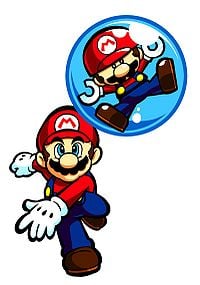
Mario vs. Donkey Kong gives Mario the same moveset as in Donkey Kong for the Game Boy. The setting is changed, with the Pauline character dropped. Donkey Kong has stolen a lot of Mini Mario toys from the Mario Toy Company, and Mario chases after him to bring the toys back. Donkey Kong also kidnaps three Toads that Mario rescues. Mario vs. Donkey Kong is another game in which Mario speaks in full sentences.
All basic stages of the game are split into two rooms. In the first room, Mario has to find the key and take it to the looked door, just as in Donkey Kong. In the second room, Mario has to get to the Mini Mario, which is locked into a bubble, and free it. The seventh level of each world is a Mini Mario level, in which Mario has to guide six Mini Marios into the Toy Box. The Mini Marios follow Mario whereever he goes. For each Mini Mario brought into the Toy Box this way, Mario gets an additional hit point for the boss battle versus Donkey Kong, which always marks the eighth level of a world.
In the game's plus levels, which only consist of one room each, the Mini Marios hold a key, and follow Mario as soon as he approaches them. Mario has to safely guide it to the door in order to unlock it. There is no "Mini Mario level" in the plus worlds, and Mario enters the Donkey Kong boss fights with 6 hit points by default.
Mario vs. Donkey Kong 2: March of the Minis
Mario vs. Donkey Kong 2: March of the Minis starts with Mario and Pauline cutting the premiere ribbon of the Super Mini Mario World Theme Park. After Pauline takes a Mini Mario toy from Mario, Donkey Kong kidnaps her. Mario chases after Donkey Kong to rescue Pauline, but his path is blocked. Instead of Mario, the playable characters in this game and all following installments of the Mario vs. Donkey Kong series are the Mini Marios. They clear the way for Mario to get to Pauline. Mario and Pauline feel sorry for Donkey Kong, and the three celebrate the opening of the theme park.
Mario vs. Donkey Kong: Minis March Again!
In Mario vs. Donkey Kong: Minis March Again! and Mario vs. Donkey Kong: Mini-Land Mayhem!, after Pauline's repeated kidnapping at the hands of Donkey Kong, Mario is requiring the help of the Mini Marios again. His role is unchanged.
Mario Bros.
After a failed attempt at a game featuring the Donkey Kong character without Mario in Donkey Kong 3, Mario was given his own starring series beginning with the release of the arcade game Mario Bros. in 1983. Only Mario's physical appearance was taken from earlier titles; the character was now a plumber working in the sewers of New York and fighting an endless number of creatures such as Shellcreepers and Sidesteppers in the sewers. Unlike later games, the player will have to make Mario jump against the ceiling of a platform from below in order to stun all enemies currently walking directly above it. When the player approaches the stunned enemies, Mario will kick the enemies out of the screen, rendering them defeated. In the two-player mode of the game, player 2 plays a palette swap of Mario. This character is introduced as Mario's brother Luigi, who dons green where Mario wears red. Luigi would get a personality and set of abilities more distinctive from Mario in later games.
Game & Watch series
Template:Expand Mario has appeared in several Game & Watch games, including Mario's Bombs Away, Mario's Cement Factory, Mario the Juggler, and Super Mario Bros. He also appeared in the later series of remakes called Game & Watch Gallery 1-4 and Game & Watch Collection.
Mario Sports games
Mario Golf series
Since 1984's Golf, Mario has appeared as a playable character in all games of the Mario Golf series. In Mario Golf for the Nintendo 64, Mario appears with Luigi in the 18th Mario Power Star hole. His drive is 270 yards and his shot is Draw.
Mario Kart series
In the series of Mario Kart games, starting with Super Mario Kart, Mario has always been a playable character. In games where characters are divided into weight groups, Mario is always a middleweight character. In Mario Kart: Double Dash!!, he is grouped with Luigi by default, and their special item is the Fireball. His kart is the Red Fire. In Mario Kart DS, his cars are B Dasher, the Standard MR, and the Shooting Star. In Mario Kart Arcade GP, he is an all-around type and shares his special character items with Luigi. Numerous tracks throughout the series have been called Mario Circuit.
Mario Tennis series
Mario is a playable character in all games of the Mario Tennis series, starting with Mario's Tennis. In Mario Tennis for the Nintendo 64 and Mario Power Tennis in both the Nintendo GameCube and Game Boy Advance versions, Mario is an all-around character. In Mario Tennis for the Game Boy Color, Mario can be unlocked by completing the Singles Mario Tour.
Mario Baseball series
Mario is also playable in Mario Superstar Baseball and Mario Super Sluggers. Again, Mario is a balanced character although Mario is a bit of a slow runner in the first game. Mario's special ball is the classic Fireball, which dazzles other players with smoky speed. Mario's abilities are very similar to Luigi's. Mario's default team is the Mario Sunshines in Mario Superstar Baseball which mostly consists of the non-playable characters from Super Mario Sunshine. In Mario Super Sluggers, his team is called the Mario Fireballs, which consists of the Mario Bros., the Baby Mario Bros., Piantas, Nokis, and a Blooper.
Mario Hoops 3-on-3
In Mario Hoops 3-on-3, Mario is a default character. His Special Shot was the Fire Shot, which involves Mario dribbling the ball around him in the shape of an M, and then either alley-oop or dunk a flaming red basketball into the hoop. To execute this move, the player must tap the touchscreen in the shape of the letter M. Mario is classified as a balanced character.
Mario Football series
In the Mario Football (or Mario Strikers in America and Japan) series, Mario takes on yet another sport, football (also known as soccer). His stats are all-around in both games, Mario Smash Football and Mario Strikers Charged Football. His Super Strike in Mario Smash Football is the Fire Strike. His Super Ability in Mario Strikers Charged Football is Super Mario!. Unlike previous sports games, where Mario stayed in his usual traditional outfit, in the Mario Strikers series, he is seen wearing different gear, including different clothes and wearing cleats. In either game, Mario's team number is 1, and captain type is Balanced.
Mario & Sonic series
Mario also appears in Mario & Sonic at the Olympic Games and Mario & Sonic at the Olympic Winter Games, where he is classified as an "All Around" character. He participates in a variety of Olympic events, such as swimming, track & field, and archery. In the Adventure Tour of the DS version of Mario & Sonic at the Olympic Winter Games, he joins forces with Sonic to save the Snow Spirits from Bowser and Dr. Eggman.
Mario Sports Mix
Mario appears in Mario Sports Mix. He is an All-Rounder type character, and all of his stats are average. His stadium in the game is Mario Stadium.
Wrecking Crew series
Wrecking Crew
In 1985's Wrecking Crew, Mario and Luigi appeared as workers on a demolition site, using hammers similar to those previously seen in Donkey Kong. Template:Expand
Wrecking Crew '98
It has been requested that this article be rewritten.
Mario had to brandish his infamous Hammer during the events of Wrecking Crew '98. Mario came back to the Mushroom Kingdom from one his quests and discovers that it was overrun with many of Bowser's new fortresses. The result of all this construction was a withering Mushroom Kingdom.
Mario decided to stop Bowser by destroying his buildings. Foreman Spike also made a reappearance, this time helping Bowser. His trusty Hammer was a great help on this adventure, as it helped him wreck and destroy Bowser's many new fortresses. The heroic plumber defeated all his foes and the Mushroom Kingdom was saved yet again.
Super Mario series
Super Mario Bros.
Since Super Mario Bros., Mario is portrayed as living in the fictional realm called the Mushroom Kingdom. In the game, Mario's objective is to rescue Princess Toadstool (later known as Peach) from Bowser, the King of the Koopas. The game is the first in the series in which regular enemies such as Goombas can be killed and Koopas can be stunned by jumping on them from above. The player can also gain power-ups and coins from having Mario jump against Question Blocks and Brick Blocks. Mario begins the game as Small Mario, who will die from any enemy attack in one hit. By using Super Mushrooms, the player can make Mario grow into Super Mario, who has an additional hit point (turning back to Small Mario after being hit). Super Mario has access to the Fire Flower, which lets him throw Fireballs that can completely knock out enemies such as Koopas or False Bowsers. Mario can also become invincible for a short amount of time with the Starman item. Luigi once again only appears as a palette swap of Mario, and only in the (competitive) multi-player mode.
Mario's role and powers remain mostly the same in all entries to the series except for Super Mario Bros. 2. While new powerups and moves are introduced, there is no deviation from the basic formula, Mario's character is unchanged, and his personality remains unwritten.
Super Mario Bros.: The Lost Levels
In the very similar game, Super Mario Bros.: The Lost Levels (sold in Japan as Super Mario Bros. 2, but an entirely different game from the Super Mario Bros. 2 game shown below), Mario or Luigi have to rescue Toadstool from Bowser a second time. Mario's traction and jumping height remain the same, while those of Luigi are changed to differentiate him more from Mario. Luigi jumps higher than Mario, but has less traction, so he takes some time to halt after running. Luigi is also now a completely separate character from Mario, so the story of the game has two alternate versions.
Super Mario Bros. 2
Super Mario Bros. 2 is a deviation from the standard formula of the series. The game was entirely based on the Japanese game Yume Kojo: Doki Doki Panic, with Mario, Luigi, Princess Toadstool and Toad being swapped in instead of the original characters, and few other references like the Mushroom thrown in. In contrast to the other characters, Mario is a balanced character with no special abilities. The gameplay is vastly different: Enemies can no longer be defeated by jumping on them, and Mario gains the power to pick up enemies, lift them over his head and throw them, a feature later reused in the Game Boy version of Donkey Kong and the Mario vs. Donkey Kong series of games. The story of the game, in which the character(s) of the player's choice frees the dream land Subcon from the tyrant Wart, is rendered as merely having been a dream of Mario.
Super Mario Bros. 3
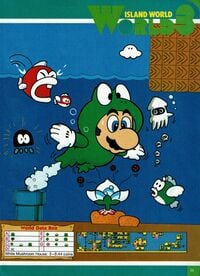
Super Mario Bros. 3 is set in the entire Mushroom World, not just the Mushroom Kingdom. Mario is joined by Luigi in the cooperative multi-player mode, and together they travel through 8 kingdoms, in which the kings have been transformed into monsters by Bowser's children, the Koopalings. During Mario's quest, he is repeatedly sent letters by Princess Toadstool, who encloses power-ups for him. Eventually, Toadstool is kidnapped, and the Mario brothers save her from Bowser in the end. Super Mario Bros. 3 introduces a plethora of new power-ups next to the Fire Flower, including Raccoon Leaves, Tanooki Suits, Frog Suits and Goomba's Shoes.
Super Mario World
Super Mario World introduces Yoshi as a sidekick character to Mario. Mario can ride Yoshis, and so gain varying new powers. Mario meets Yoshi on a holiday in Dinosaur Land, where Bowser kidnaps Toadstool again and it is up to Mario, and, in the cooperative two-player mode, Luigi to rescue her again. Super Mario World was the first Mario game to have a second jump button for a different jump - the Spin Jump with which Super Mario can destroy Rotating Blocks from above or jump off Yoshi's back. Mario can use Cape Feathers to turn into Cape Mario allowing him to take off from the ground and stay in the air for quite a while. Mario can also use Grab Blocks and throw them at enemies or obstacles.
Mario and Luigi defeat the Kooopalings in their castles, rescue the captured Yoshi Eggs and defeat Bowser in the Valley of Bowser rescuing Toadstool and taking her home to Yoshi's Island.
Super Mario 64
Super Mario 64 first allowed players to control Mario in a three-dimensional environment, which drastically altered his powers. Mario could now crouch and combine ducking with jumping. Pressing ducking and jumping while standing still would result in a backwards somersault, and doing it while running would result in a Long Jump. It was possible to jump higher when doing consecutive jumps (the Triple Jump), and a side somersault could be performed by quickly changing Mario's direction. The game also gave Mario the ability to punch, kick, use the Ground Pound, and climb on trees. The played could give Mario special abilities by using Exclamation Mark Blocks, like the Wing Cap or the Metal Cap. Super Mario 64 was also the first game which added an Air meter to limit the time Mario can spend underwater. Mario's air can be refilled with coins or water bubbles. Mario can also lose his hat in the game, and until he gets it back, he will take more damage from all enemy attacks.
In the game, Mario is invited to have a cake with Princess Peach at her castle, but finds the castle taken over and Peach kidnapped by Bowser when he arrives there. When facing of against Bowser, Mario grabs his tail and spins him around to throw him off the fighting platform. After being rescued, Peach kisses Mario and bakes him the cake.
In the game's remake Super Mario 64 DS, Mario is among those trapped in the castle's portraits by Bowser, and Yoshi rescues him from there. From then on, Mario is a playable character, alongside Yoshi, Luigi and Wario, and his special ability is the floating power gained by the Power Flower. Mario can still use the Feather, this game's equivalent to the Wing Cap, which gives him more abilities than the other characters. Other characters can transform into Mario, gaining his appearance, but not his voice, by putting on Mario's Hat. Mario himself can transform into Luigi and Wario this way, but not into Yoshi. The game's story is otherwise identical to that of the original game.
Super Mario Sunshine
Super Mario Sunshine featured a more advanced introduction and storyline background than usual in games of the Super Mario series. Mario, Peach and Toadsworth travelled to the tropical island of Isle Delfino to have a vacation. Upon arriving, Mario is immediately confronted with charges for crimes commited by a shadowy figure similar to him in appearance, Shadow Mario, who has covered large areas of the island in Graffiti. Mario is sentenced to clean the entire island off the dirt, and is given the device FLUDD to do so.
The game removed most jumping, punching and kicking abilities of the previous game and replaced them with FLUDD's powers, which Mario could use to spray water at enemies and clear areas of graffiti. Expansion Nozzles for FLUDD can make Mario hover in the air for a short while, make him run at a turbo speed or rocket high up in the air. Water for FLUDD can be refilled at any body of water in the game, or with Water Bottles. Mario can also ride Yoshis. In the Secret Levels of the game, FLUDD is taken away from Mario and he can only use his basic jumping abilities and the Ground Pound to beat the stage. When Mario loses his cap in Super Mario Sunshine, he takes damage from the sun permanently and dies eventually.
Shadow Mario is revealed to be a disguise by Bowser's son Bowser Jr., who kidnaps Peach. From this point on, the game's story follows the standard Mario formula and Mario's role of a "princess rescuer" from previous games is kept. The game is the first to try to display an emotion for Mario, in a scene where he thinks FLUDD is defunct. Mario is seen with a worried look on his face there.
New Super Mario Bros.
New Super Mario Bros., released in 2006, is a game very similar to earlier Super Mario Bros. games by design, Mario's role is almost identical here. The beginning of the game shows Mario and Peach taking a walk outside of Peach's castle, when a lightning hits the castle. Mario quickly runs off to check it, while Peach stays behind, and is thus kidnapped by Bowser Jr. The lightning bolt at the castle was just a distraction for Mario. Throughout the game, Mario chases Bowser Jr. in order to save Princess Peach.
Mario's powers still include throwing Fireballs when having a Fire Flower, and this time also size-changing effects induced by the Mega Mushroom and the Mini Mushroom. The former lets Mario grow to a giant size, being able to crush all enemies and obstacles like pipes, while the latter lets Mario shrink to a tiny size, which gives him access to new areas.
New Super Mario Bros. Wii
Mario's role and abilities stay identical in the sequel New Super Mario Bros. Wii, although there are a few added power-ups and the story is changed slightly. Template:Expand
Super Mario Galaxy
Super Mario Galaxy brought back most of the jumping mechanics present in Super Mario 64 missing in Super Mario Sunshine. The game also added new powers, including the Star Spin and the Wii pointer, which can be controlled independently from Mario. The Wii pointer allows players to shoot enemies or grab Star Pieces without controlling Mario, although Mario is repeatedly reminded of these functions by in-game characters, so it is debatable whether using Pull Stars or collecting Star Pieces from afar can be considered a power of Mario or not.
In the game's story, Mario is invited to the Star Festival by Peach, but her entire castle is abducted by Bowser during the festival, and Mario is thrown into outer space. When recovering in the Gateway Galaxy, Mario is asked by Rosalina to rescue the Power Stars in order to save Peach. Mario is given the Baby Luma, who allows him to star-spin and travels with him to all locations. Throughout the game, Mario also receives letters from Peach, who sends him 1-Up Mushrooms.
After several encounters with Bowser, Mario defeats him in Bowser's Galaxy Reactor. Bowser's star explodes and creates a black hole. Mario is seen in a state of shock when the Baby Luma sacrifices itself to prevent Bowser's black hole from consuming everything around it, including Mario and Princess Peach's castle. After a big explosion, in which the Black Hole is turned into a Wormhole, Mario reappears in an unknown location in front of a giant Rosalina who speaks to him. After Rosalina finished talking to Mario, he wakes up in the castle grounds in the Mushroom Kingdom, and Rosalina hints that Mario was revived from the dead by the star dust.
Super Mario Galaxy 2
The game Super Mario Galaxy 2 tells an alternate version of the story of the previous game, with even less of a story. When Mario arrives at Princess Peach's castle this time, a Giant Bowser just kidnaps Peach. Mario finds Starship Mario and flies off to collect Power Stars in order to reach Bowser and Princess Peach. Aside from additional power-ups and the addition of Yoshi, the gameplay is identical to the first Super Mario Galaxy game. Mario defeats Bowser and saves Peach in the end. Rosalina and her Comet Observatory appear before Mario and Peach. Rosalina thanks Mario for watching over the Luma that he had found, and the Luma returns to the Comet Observatory along with Mario's hat. Mario and his companions return to the Mushroom Kingdom.
Super Mario (Nintendo 3DS)
Mario is set to appear in a Super Mario for the Nintendo 3DS. Screenshots suggest that the game is based on either Super Mario 64 or Super Mario Galaxy, so Mario's moveset might be drawn from those two games. It also shows the first use of Small Mario in a 3D game.
Super Mario Land series
In Super Mario Land, Mario travels to Sarasaland in order to rescue the land's princess Daisy from the alien Tatanga. Mario's powers in the game are limited to Superball Mario, in which he can shoot balls that ricochet of walls, as well as the Marine Pop, a submarine, and the Sky Pop, a helicopter, each in a special scrolling stage. When he rescues Princess Daisy, Mario is kissed by her, and the two fly off in a spaceship.
Super Mario Land 2: 6 Golden Coins introduced a new antagonist to Mario named Wario. Wario took over Mario's Castle while Mario rescued Princess Daisy in Sarasaland (the events of Super Mario Land). The player's objective here is to regain control of Mario's castle, now known as Wario's Castle.
Although Wario Land: Super Mario Land 3's title had Mario's name in it, Wario was the protagonist of this game. Mario is mentioned as one of Wario's motivations to go on a treasure hunt in the game's manual. Mario himself makes a small appearance at the end of the game, where he steals a Princess Peach statue from Wario.
Appearances in Other Media
It has been requested that this article be rewritten.
The Super Mario Bros. Super Show!
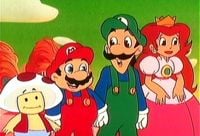
Abandoning carpentry and leaving Donkey Kong to his own devices, Mario entered the plumbing business with Luigi and formed Mario Brothers Plumbing as revealed in The Super Mario Bros. Super Show! The pair worked on plumbing from the business's headquarters, performed house calls, and also released a line of products. As the years passed, they remained financially unsuccessful, but gained a reputation for their plumbing skills and were recognized by the Grand Order of Plumbers as Plumbers of the Year in "Plumbers of the Year" despite an embarrassing appearance on David Horowitz's worldwide television show that ruined the reputation of their product line in "The Marios Fight Back"
Mario and Luigi had a variety of mainly benign adventures. For example, in "Texas Tea" the brothers became rich from an oil well in their tomato garden. However, they were endangered on several occasions, such as in "Slime Busters" when the brothers were attacked by Slime Ghosts. Despite their adventures, Mario confided to Luigi in "Baby Mario Love" that he was dissatisfied with his current life, complaining it lacked glitz and glamor.
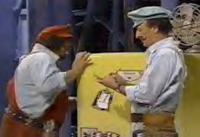
Two conflicting stories of how the Mario bros. returned to Mushroom World exist. The first originates from The Super Mario Bros. Super Show! introduction and later expanded on in "Toddler Terrors of Time Travel." Mario and Luigi were performing a house call for a slightly daft lady who hired them to fix her bathtub drain. Unknown to them, the drain was a Warp Zone connected to the Mushroom World. After Luigi cleared it, Mario and Luigi were sucked towards the drain. Mario grabbed onto the shower curtain bar, but Luigi was already in the drain's suction. Grabbing unto Mario, Luigi ended up pulling both of them down. Later, Mario and Luigi were forced to relive this event due to Kooky von Koopa's Time Travel Tube. The events were slightly altered. Instead of struggling against the drain, Mario and Luigi openly jump through the pipe. The two were warped from the past Earth to the present Mushroom World, ending the process of overwriting past events.
The second was invented for "The Legend." While Mario ate lunch one day in Mario Brothers Plumbing, the brothers heard a cry for help through a very small pipe. Springing into action, they grabbed their plungers and followed the voice, which they later learned belonged to Princess Toadstool.
The Adventures of Super Mario Bros. 3
Template:Appeared The Adventures of Super Mario Bros. 3 follows after the events of The Super Mario Bros. Super Show! This series of episodes are based on Super Mario Bros. 3. Unlike in the previous series, this one has Mushroom Kingdom in a more peaceful state. Mario has more enemies to fight, most notably, the Koopalings. The only episode Mario does not appear in is Life's Ruff.
Super Mario World (television series)
Template:Appeared The Super Mario World (television series) is a continuation of the previous series, The Adventures of Super Mario Bros. 3. This time, the episodes focuses loosely on the video game Super Mario World with added characters, the most prominent, Yoshi, the Cave People, and Oogtar. Mario appears in every episode of the Super Mario World television series as one of the main protagonists.
Mario is Missing!
The 1992 game Mario is Missing! was the first game in the Mario Discovery Series[2] of Educational Games and brought the Mario characters back to the Real World. When hearing of Bowser's plan to flood the Earth by melting Antarctica's ice with hair dryers, Mario, Luigi and Yoshi head to Bowser's castle in the Antarctic. Mario is captured, although the exact circumstances of his capture vary greatly between the systems the game appeared on.
In the DOS version, Mario enters the castle alone, as Luig is too scared to follow. Mario meets Bowser, who is in a butler disguise, and accepts candy from him, despite Luigi's warning not to take candy from strangers. Bowser uses this as a distraction to trap Mario in a net. In the NES version, Mario is captured outside in the snow by a Koopa with a bag. In the SNES version, Mario traps into a pitfall outside the castle.
The game centers around Luigi, who rescues Mario from Bowser in the end.
Mario's Time Machine
In Mario's Time Machine, Bowser uses a time machine to steal various artifacts from different time periods of human history in order to display them at his museum. Mario goes on a mission to return all objects of Bowser's museum to their original time periods in order to prevent history from being altered. Additionally, Mario had to rescue Yoshi from Bowser in the NES version of the game. Mario's Time Machine is one of the few games in which Mario talks.
In the NES version, the player has to play an altered version of Mario Bros. to defeat Koopa Troopas, who drop the stolen objects when defeated. Mario then has to travel back in time to return the objects to their proper place in a side-scrolling mission.
In the SNES version, Mario has to pick a stolen object from the museum and then go to a "Time Surfing" level to collect enough Mushrooms to make a time jump, then return the objects to their proper place.
Yoshi's Safari
InYoshi's Safari, Mario and Yoshi are sent by Princess Peach to rescue Jewelry Land from Bowser's occupation. In this game, Mario uses a gun called the Super Scope (controlled by the player with said accessory for the Super Nintendo) to shoot enemies while riding on Yoshi's back. Mario fought the Koopalings and Bowser to free King Fret and Prince Pine of Jewelry Land.
Mario & Wario
In Mario & Wario, Mario is a passive character. Wario drops buckets or barrels or similar objects on his head, making him unable to see. The fairy Wanda has to guide Mario safely to Luigi through hazards and traps in each level. When arriving at the end of the level, Luigi will free Mario from the sight-blocking object. Mario is only one of the characters that have to be guided through levels by Wanda like this in the game. The other characters are Princess Peach and Yoshi. Mario walks at a medium spead, while Peach is slow and Yoshi is fast.
Hotel Mario
In Hotel Mario, Mario and Luigi travel to the Mushroom Kingdom after an invitation for a picnic by Princess Peach. Upon arriving, the two find out that Peach has been kidnapped by Bowser, who has made her a "permanent guest" in one of his seven Koopa Hotels. Mario and Luigi travel from one Koopaling's hotel to the next, with Peach being brought to a new hotel every time the brothers have searched through the last one. After destroying most of the Koopaling hotels, Mario fights Bowser in his own hotel and defeats him. He then receives a kiss from Princess Peach, then congratulates the player as 'The best ever'.
In the game, Mario has to close all doors in a hotel in order to proceed. Mario can jump on enemies to defeat them, similar to the Super Mario series. He can also hide in open doors and take elevators to change his level.
Yoshi series
- Main article: Baby Mario
Super Mario World 2: Yoshi's Island
Super Mario World 2: Yoshi's Island tells the story of Mario shortly after his birth. According to the game, Baby Mario and Luigi were brought to the Mushroom World by the stork, but the stork was attacked by Baby Bowser's forces and Luigi got kidnapped. Mario plummeted towards Yoshi's Island, where he met Yoshi. Yoshi consulted his fellow Yoshis and they worked out a plan to trek across the island in an effort to save Luigi and return the babies to their parents.
During the game, Mario rides on Yoshi's back. When Yoshi is hit, Mario falls off and is trapped into a bubble. If the Yoshi does not catch the bubble in a short period of time, Mario is kidnapped by Toadies. In that case, the level has to be restarted. Mario can also run around the level when Yoshi collected a Super Star, which turned Mario into Super Baby Mario for a short time.
At the end of the game, after Luigi's rescue, Mario and Luigi are brought to their mother and father.
Yoshi Touch & Go
Yoshi Touch & Go, unlike other Yoshi games, has no story. Where, when, and how the events took place is unconfirmed.
Each level in this game begins with Baby Mario falling from the sky with balloons. The player must guide him with clouds while destroying obstacles with bubbles. Soon, Baby Mario lands on a Yoshi's back, and Yoshi finishes the rest of the level.
Yoshi's Island DS
When Mario was a little older, Kamek and his Toadies made a second attempt to ensure a safe future for the Koopa Troop in Yoshi's Island DS. They kidnapped countless babies, searching for all of the Star Children. Mario and Luigi were taken from their home in the night as their parents cried out for them, unable to stop the kidnapping. However, the Stork noticed Kamek and his Toadies taking away several babies. He attacked the Toady holding Mario. The Toady panicked and dropped Mario, who fell again towards Yoshi's Island. Yoshi and his friends again found the baby and sought to defeat the Koopa Troop one more time. In the process, they learned to utilize the abilities Mario granted to the Yoshi he rode on. They found Baby Peach, Baby Donkey Kong, Baby Wario, and Baby Bowser along the way, all of whom worked with the Yoshis to defeat the Koopa Troop. As they progressed, Bowser traveled from the future to assist his Koopa Troop of the past. The Yoshis were able to defeat him with the help of the babies. Mario was returned to his parents alongside his brother and the family was reunited.
Mario Clash
Mario shot at Koopas and various other enemies in Mario Clash, a game for the Virtual Boy. Mario has to knock enemies away with Koopa Shells. Mario has to mainly hit them in the side. The game's gameplay was similar to the style of Mario Bros., but Luigi did not make an appearance.
Super Mario RPG: Legend of the Seven Stars
Mario battled strange machine-like creatures from another dimension during the events of Super Mario RPG: Legend of the Seven Stars. Many things have changed, Mario even gets his own house. Mario first went to confront Bowser who had again captured Princess Peach (which by now is a recurring event). Mario walked to Bowser's Keep (Bowser's Castle) which is strangely located near Mario's Pad in this game. Mario battles Bowser atop a Kinklink and rescues Peach. Then a huge sword called Exor struck the castle from atop and knocked them all to various spots in the Mushroom Kingdom. Fortunately, Mario fell through the Pipe on top Pipe House (Mario's Pad) and landed right on his bed.
Mario discovered that the Star Pieces that grants dreams had been stolen by a group called the Smithy Gang run by Smithy. These criminals had not only stolen the Star Shards, they had caused much trouble to the Mushroom Kingdom. On this quest Mario was joined by Mallow, Geno, Peach, and even Bowser. They traveled through much of the Mushroom Kingdom in search of the Star Shards protected by the Smithy Gang's strongest members. After all Star Shards were collected, Mario had to go to Smithy's dimension and fight him once and for all. Mario of course had to reach it through Bowser's Keep which was inaccessible when Exor destroyed the bridge. With the help of Mallow's parents, King and Queen Nimbus, Mario had passage through a special cloud bus. When they finally got there, Mario defeated Exor and went to Smithy's dimension via Exor's mouth.
Mario's journey wasn't over as Smithy had even more minions at his disposal. After many grueling battles Mario faced Smithy, who was inevitably defeated and once again the Mushroom Kingdom was saved by Mario.
Mario Party series
Mario is always represented by his trademark red color. The mini-games test Mario's luck, skill, and endurance and reward him with coins. In the first three Mario Party games, Mario aimed to become the superstar. Though Mario doesn't have many distinguishable abilities from the other Mario Party characters, the most notable difference is Mario's ability to use the Fireball Orb in Mario Party 7. Whenever Mario used an Orb on a space, the space would have Mario's "M" insignia. As revealed in the official artwork of Mario Party 4, Mario's item of choice is the Mega Mushroom. Mario's Duel Mode partner is the defensive Koopa Troopa in Mario Party 3, and the booklet says that his favorite item is the Golden Mushroom. He also challenged the player for the Courage Star Stamp if he was not selected. Throughout the series, Mario's famed jumping ability is also evened out with the other characters, leveling the playing field. This also shows Mario's chemistry between other player when they team up.
Super Smash Bros. series
- Main articles: SmashWiki:Mario (SSB), SmashWiki:Mario (SSBM), SmashWiki:Mario (SSBB)
Mario has been playable in every Super Smash Bros. game to date. Mario has retained his balanced abilities even when fighting characters from other series. He brought with him many items, stages, and characters to compete in the tournament. Mario's alter-egos Dr. Mario and Metal Mario followed as well. Mario is usually portrayed as a "main" character alongside Link, Kirby, and Pikachu. He does not need to be unlocked in any Super Smash Bros. and is always playable at the start. Mario's skill is reflected by the player, as mentioned by the Adventure mode Mario trophy.
Solid Snake Codec Conversation
- Colonel: Snake, you know who that is?
- Snake: You're kidding, right? It's Mario.
- Colonel: Mario made his first appearance in 1981, and since then, he's become a worldwide phenomenon. There's probably not a single person who doesn't know Mario. He's that famous.
- Snake: Good thing I survived long enough to meet him on the field of battle, huh.
- Colonel: This is a once-in-a-lifetime chance, Snake. Now get out there and show him what you're made of. No regrets.
- Snake: Got it.
Role in the Subspace Emissary
In the beginning, a trophy of Mario and Kirby are thrown into an arena. The two come to life and fight. The player chooses the one to play with. If Mario is chosen, the opponent will be Kirby. After the battle between the two, Mario resurrects Kirby. This scenario happens the other way around if the player chooses Kirby instead. The Subspace Army then ambushes the two. Peach and Zelda come to help and they are all confronted by the Ancient Minister. After seeing the two R.O.B.s setting up a Subspace Bomb, Mario runs to try and stop it, only to be blasted away by Petey Piranha. Afterwards, he meets Pit after the latter has descended from Skyworld. They team up and reach land and give chase to the Ancient Minister, but they lose him.
Eventually, Mario sees Peach's trophy form apparently dissolving. Thinking Link and Yoshi have done this, Mario and Pit attack them, only to be defeated and stolen by King Dedede. Kirby, however, saves them both, and Pit shoots an arrow at the Cargo that Dedede was driving, blowing its engine out. Keep note that this only happens if Peach was rescued from Petey Piranha.
If Zelda is rescued, Mario and Pit end up facing a False Zelda, with Pit destroying her Dark Cannon that she was about to fire at Link and Yoshi. Link sees the Zelda trophy dissolve, and he and Yoshi attack Mario and Pit. Mario and Pit defeat them, but Mario sees the Peach trophy in the Cargo before Dedede takes Yoshi and Link. When Kirby saves them, Link is the one that blows out the engine.
Regardless, Mario and his team chase Dedede through a cave and into his castle, only to find his throne room a mess and himself and the trophies he had nowhere to be found. They go through a secret passage and see Bowser trying to get away. Mario attacks, only to find that he has the princess not rescued from Petey Piranha. Pit fires an arrow, but Bowser dodges, and the badge that the princess was wearing falls. Bowser gets away, and Kirby eats the badge.
Mario and his team encounter the Ancient Minister again later and chase him through the Wilds, but the R.O.B.s stop them and detonate the Subspace Bomb that the Ancient Minister was carrying. Mario and his team escape and end up fighting the Subspace Army at the Canyon where they meet the Ice Climbers, Marth, Lucas, the Pokémon Trainer, and Ike.
Eventually, the rest of the heroes join them and they head off into Subspace itself, taking down a Subspace Gunship along the way. In Subspace, they discover that Tabuu was behind the Subspace Army after all. Tabuu fires his Off Waves at them, turning them all into trophies. Mario was then rescued by King Dedede and his team consisting of Luigi and Ness; it turns out that Dedede knew of Tabuu and designed the badges to revive fighters from their trophy forms after a certain amount of time. Luigi and Ness were wearing the badges, and the one Kirby had eaten revived him as well. Everyone else was recovered by either Dedede's team or Kirby, with Bowser, Ganondorf, and Wario, who all had been working with the Subspace Army, joining them after learning about what Tabuu had done. Everyone went to confront Tabuu in the center of the Great Maze. Tabuu attempts to use his Off Waves again, but Sonic the Hedgehog suddenly appears and attacks Tabuu's wings, weakening the Off Waves considerably. Although the Off Waves were still powerful enough to score an instant knock out on someone, Mario and the others were able to defeat Tabuu, restoring most of the world back to normal.
Special Moves
Fireball
- Main article: SmashWiki:Fireball
Mario shoots red fireballs out of his palm. It is his normal B move, and it is used by the Mario and Luigi in all three games. Mario's Fireballs are affected by gravity (meaning they bounce against the ground), while Luigi's shoot straight no matter what, unless it ricochets off something in front of Luigi. Kirby can also use the Fireball move once he has sucked up Mario.
The move originates from the Super Mario Bros. games, whereas if Mario or Luigi grab a Fire Flower, they gain the ability to chuck fireballs from their hands.
Cape
- Main article: SmashWiki:Cape
Mario uses Cape as an attack in each installment of the series. It is his Side + B move. While this attack is not particularly powerful, it is useful in that it can reverse the direction of certain projectile attacks. It can also make the foe spin around, and face the other direction. Interestingly enough, it's the only move that can reflect Mario's F.L.U.D.D. move. Also note that when Mario uses his cape it is not actually tied around his neck but held in his hand and swung.
The move originated from Super Mario World, when Mario grabs a Cape Feather, he will get a cape and can attack enemies just by swinging it.
Super Jump Punch
- Main article: SmashWiki:Super Jump Punch
The Super Jump Punch is a jumping move Mario, Luigi, and Dr. Mario can perform in the Super Smash Bros. series. It is executed by pressing B while holding the control stick upwards at the same time. When Mario performs the attack, coins fly out of the enemy, and the foe receives about 10% damage. Mario's Super Jump Punch has not changed at all throughout his appearances.
This move originated from Super Mario Bros., where if Mario jumps under certain blocks, coins will appear from the blocks. Plus, Mario, when using the move, would always be in the pose when he jumps in Super Mario Bros.
Mario Tornado
- Main article: SmashWiki:Mario Tornado
Mario Tornado is a special move that Mario can use as an aerial attack. After pressing B and tilting the control stick in the down position, Mario would spin around, suck the foe in, spin them silly, and then spit them out, damaging opponents, in a similar fashion to Luigi's Luigi Cyclone. The move is powerful, but is best used when surrounded by opponents. Mario Tornado, unlike Luigi Cyclone, cannot move very far. By repeatedly tapping the B Button, Mario will also move vertically while using the attack.
The Mario Tornado is replaced as his down special move by F.L.U.D.D. in Super Smash Bros. Brawl. Mario Tornado is still one of his normal attacks, executed by pressing Down A in mid-air. In both games, Mario can use the attack in mid-air.
It is possible that this move originated from Super Mario World, where it's called the Spin Jump and/or Super Mario land 2 when you are in midair you press down you will spin. A mushroom is needed to do this.
F.L.U.D.D.
- Main article: SmashWiki:F.L.U.D.D.
F.L.U.D.D. is a special move that Mario can use in Super Smash Bros. Brawl. When Mario uses the move, he will put F.L.U.D.D. on his back and douse his enemies with water.
The attack will have no effect on the opponents' damage percentages whatsoever, however, it can still have a lot of benefit to Mario, as the water can blast foes great distances, possibly resulting in a KO. F.L.U.D.D. can also be charged before use, resulting in a more powerful stream of water. It is best used at enemies near the edges of the battle.
This move originated in Super Mario Sunshine, where the F.L.U.D.D. is a key element in the game. Using F.L.U.D.D., Mario can spray water at enemies, or clean up a part of a level. However, unlike in Sunshine, F.L.U.D.D. has various nozzles that can be used for various purposes, whereas in Brawl, F.L.U.D.D. can only use the spray nozzle.
Mario Finale
- Main article: SmashWiki:Mario Finale
The Mario Finale is Mario's Final Smash in Super Smash Bros. Brawl and is also the first Final Smash ever shown. As with any Final Smash, Mario must first collect a Smash Ball. Mario unleashes a giant wave of flames, which expands vertically before him. This bursts across the stage in front of him devastating any opponents in front of him by causing damage and pushing them off the screen along with the wave. This is best used on the sides of a stage. This way, enemies will be unable to stand behind Mario and be safe from the blast. This move was the first Final Smash shown in the 2006 E3 trailer. The move is an original one, not based on any specific power in the Mario series other than the traditional Fire Mario.
Paper Mario series
Paper Mario
Mario once again is invited to Princess Peach's Castle during the events of Paper Mario. However, this time Mario is invited to a party in the castle. Mario had rushed to the castle, made his way through the bustling party guests, and was chatting with Princess Peach in the throne room. However, Bowser usurps the castle, bringing it high in the air. He and Kammy Koopa break in to the castle through the window and using the power of the Star Rod, defeats Mario. He then tosses Mario out of the shattered window. Mario lands in a small forest located on the outskirts of Goomba Village. Goombas, being a proficient enemy in many of his quests, surprises Mario with their hospitality. Mario gives his many thanks and heads back to Toad Town via Goomba Road, together with the Goomba's families eldest child, the young adventurer Goombario.
Mario hears a Star Spirit called Eldstar asking for his help. The Star Spirit requests that he speak to him on Shooting Star Summit, in which he has more strength to speak better. Once there, Mario meets many other Star Spirits asking for his help. He learns that Bowser had imprisoned them in special cards and has given them to his strongest minions. Mario then sets out on a quest in search of the Star Spirits. Mario makes many new friends and partners on his long grueling journey and eventually collects all seven Star Spirits. Mario returns to Shooting Star Summit where he gains access to Star Way. Mario acquiers a new ability called Star Beam and is transported to Bowser's Castle from the Star Shrine. While Mario and his team are at Bowser's Castle, they save the many prisoners and fight Bowser at the top of the castle.
Using his dirty tactics, Bowser breaks all routes of escape and uses his Star Rod to fight. Mario and the team cannot defeat Bowser while he is using the Star Rod, so they instead use Star Beam to weaken his power. The reluctant Bowser is unaffected by it and shakes the beam's power off. Watching the team's defeat, Peach asks the people of the Mushroom Kingdom to help Mario and his friends fight through their wishes. Twink helps her convey this message of hope through her wish and suddenly Mario wakes up from his fainted status. He recovers all of his health, and learns a new upgraded version of the Star Beam called Peach Beam. Mario and company, fresh and ready to go, face Bowser to round two. Mario shoots the Peach Beam at Bowser, leaving him defenseless and ready for a fair fight. Mario and his friends defeat the evil Bowser and once again save the Mushroom Kingdom. The castle returns to ground from where it came from and another party is held there later. The power of wishes is restored and once again the Mushroom Kingdom is saved by Mario and company. After a parade led by Luigi, Mario takes Peach to his place where they watch the fire works.
Paper Mario: The Thousand-Year Door
Peach asked Mario to come to a land called Rogueport during the events of Paper Mario: The Thousand-Year Door. She found a treasure map leading to powerful artifacts called Crystal Stars. By the time he got there, Peach had been kidnapped by a group known as the Secret Society of X-Nauts. They needed to use her as a vessel for the Shadow Queen so that the leader of the X-Nauts, Sir Grodus, can use her power to aid him in world domination. Mario met an intelligent Goomba called Professor Frankly. He told Mario the history of Rogueport and revealed the secret of The Thousand-Year Door.
The Shadow Queen once took control of Rogueport, enslaving and killing many of its citizens. To achieve this, she created the Crystal Stars and used them to give her great power. The Four Legendary Heroes used the power of the Crystal Stars against her and she was imprisoned in the Thousand Year Door for a millennium. Mario set out to collect all seven Crystal Stars. Gaining many new partners and finding all Crystal Stars, Mario went through the Thousand Year Door. There he found Sir Grodus standing before the Shadow Queen's room. Mario defeated Sir Grodus, but was then ambushed by Bowser and Kammy Koopa. This gave Grodus time to escape with Peach to the Shadow Queen's room. When Mario got there, Grodus had awakened the Shadow Queen herself, taking control of Peach's body. Mario had to fight her possessed form and using the help of the Rogueport citizens' wishes, Mario prevailed.
In Glitz Pit, Mario and his parter's team was named "The Great Gonzales" (in Japanese: 『じごくかちまた しょけいにん』グレート・ゴンザレス) by Grubba.
Super Paper Mario
Mario and Luigi were once again called into action in Super Paper Mario. Mario and Luigi sit in their house one day when they hear the news that Princess Peach has been kidnapped. The Mario Bros. rush to Bowser's Castle, thinking he has the princess, but he didn't. Later, a strange new enemy named Count Bleck shows up and kidnaps Luigi and Bowser. It also turns out Count Bleck has Princess Peach too.
Mario is transported to Flipside, a strange town between dimensions. Mario later finds Bowser and Princess Peach who decide to join with Mario in his quest to stop Count Bleck. Mario must go through eight chapters to get eight Pure Hearts, which can counter the Chaos Heart. Mario also encounters new enemies such as O'Chunks, Dimentio, Brobot, Mimi, Nastasia and even his brother Luigi; now called Mr. L because Nastasia, an assistant of Count Bleck, brainwashed him (however he joined Mario once he was freed by Dimentio and sent to The Underwhere).
After collecting the eight Pure Hearts, Mario, Princess Peach, Bowser, Luigi and some Pixls face Count Bleck. After defeating Bleck, Dimentio, a former minion of Bleck, turns on him and teleports him to Dimension D to deal with him later. Then Dimentio, the Chaos Heart and Luigi merge together to form Super Dimentio as the final boss. After defeating Super Dimentio, Count Bleck and Tippi get married to stop the Void.
Luigi's Mansion
Mario played his second role as a captive during the events of Luigi's Mansion. Mario went to check out a mansion that Luigi mysteriously won. There, a huge Boo called King Boo overpowered Mario with his many Boos and imprisoned him within a portrait. King Boo was apparently mad at Mario for harassing his kind during his past adventures. Luigi came later to find out why his brother didn't come back. Luigi overcomes his cowardice and finally captured all Boos using his Poltergust 3000. He then faced King Boo, who had possessed a Bowser suit. After he defeated King Boo, Luigi took Mario's portrait and reverted the plumber back to his original form, using Professor Elvin Gadd's Portrificationizer in reverse. He is left dizzy in the remains of the picture Frame while Luigi laughs at him.
WarioWare series
Mario didn't make a big appearance in the WarioWare series, but he made small cameos in some microgames in WarioWare: Touched!. He appeared as a blackboard drawing in Jimmy T.'s microgame Chalk Full, and appeared in Wario-Man's microgame You Scratch Mine, alongside Wario and even Toad.
Mario & Luigi series
Mario & Luigi: Superstar Saga
After Mario's vacation, Mario ventured with his brother Luigi through strange lands during the events of Mario & Luigi: Superstar Saga. An ambassador from the Beanbean Kingdom came to visit Princess Peach. However, the ambassador was actually a fake and was one of the most wanted criminals in the Beanbean Kingdom. Cackletta was this wicked impersonator who stole Princess Peach's voice during the visit. Toad came running to Mario's Pad warning him about Princess Peach's voice dilemma. As soon as Mario came out of his bathroom, he sped to the castle, dragging Luigi behind him. There they met Bowser, adding more to their troubles. Mario fought Bowser, but Peach spoke and interrupted their fight. As she spoke, explosives dropped from her mouth and shook up the castle. Bowser, outraged that another villain has stolen his spotlight, suggested that they go to the Beanbean Kingdom with his Koopa Cruiser.
Cackletta's apprentice, Fawful caused the Koopa Cruiser to crash causing Mario and Luigi to land on the Beanbean Borderlands. Mario and Luigi went to the Beanbean Castle after rescuing Prince Peasley from his horrible transformation. After saving Queen Bean, they went to the Beanbean International Airport expecting Princess Peach. Clearing the Airport of a few Piranhas, Peach's Plane landed on the runway. Mario, surprised to see Princess Peach talking in her normal voice, asked how she got her voice back. After the Princess's visit, Princess Peach requested to go to Little Fungitown. During their short stay, she got kidnapped. At Beanbean Castle, they heard from Bowletta (Cackletta's possessive body of Bowser), that the Beanstar has been scattered after the second battle with Popple and Rookie (Bowser as Popple's second-hand man). So Mario headed out to find the four scattered Beanstar Pieces. Going through a long journey around the Beanbean Kingdom, they managed to get all Beanstar Pieces. After that, they returned to the castle, and Bowletta again sent a message to deliver the restored Beanstar to Joke's End, with Peach in return. Peasley gave the bros. 99.999.999 Mushroom Coins, which are actually worth 99 Beanbean Coins. Then Mario went to Joke's End to save Peach. They saved her by using a clever trick to let appear a "second" Peach, who actually was Luigi. Bowletta discovered this in her somehow-repaired Koopa Cruiser, but Luigi managed to escape.
However, Bowletta also took over Bowser's Castle and attacked the Beanbean Castle Town. Mario and Luigi asked Blanbladon to take them to the flying fortress in the sky. After defeating many Koopalings and strong enemies, they reached the throne room. When they defeated Bowletta she sucked them into her body where they had to fight Cackletta's Spirit. Mario and Luigi finally finished Cackletta and her spirit. They escaped from the castle (which was set to blow up) in time, saving the Beanbean Kingdom.
Mario & Luigi: Partners in Time
Mario and his brother Luigi took a trip back in time during the events of Mario & Luigi: Partners in Time. Mario and Luigi were at Princess Peach's Castle, watching Princess Peach take a trip to the past using Professor E. Gadd's Time Machine powered by the Cobalt Star. Toadsworth got overworried about the princess' return, and fainted. Mario therefore went over to Toadsworth's Room to get the Refreshroom and revived Toadsworth from his fainted state. However a few minutes later the Time Machine returned, but not with Princess Peach. A large green fungus called the Junior Shrooboid attacks Mario and Luigi. They managed to beat the monster. Afterwards, a Time Hole appeared in the center court of the castle.
Mario and Luigi looked at it in awe, when Toadsworth came and accidentally knocked Luigi into the Time Hole. Mario went in to save him and they went back in time. They landed on the starting road to Hollijolli Village, fighting more and more strange creatures. They saw the village damaged and ruined by many Shroobs and Shroob UFOs. Mario and Luigi helped the Hollijolli Mayor out of a chimney he got stuck in while he was trying to escape. They then got assaulted by a wave of Shroobs and Shroob UFOs. They then left the two brothers lying on the ground. Meanwhile, Baby Mario and Baby Luigi came to their rescue and finished the remaining Shroob foes.
Baby Bowser helped them escape for because of Baby Peach's incessant crying. They boarded his Koopa Cruiser and crash landed into Bowser's Castle as a result of the Shroob UFOs aerial attacks. Mario and Luigi looked for their younger selves and headed for Baby Bowser's room. There, a Time Hole was located and the four Mario Bros. headed back to the Princess Peach's Castle of the future. Professor E. Gadd spoke to them and advises that they go find pieces of the Cobalt Star Shards.
Mario and the others noticed the new Time Holes that sprung up around the castle. They met Toadiko and Toadbert who told them about the Shroobs and the Princess Shroob. They finally collected all five Cobalt Star Shards, and broke the barrier of the Shroob Castle (previously Princess Peach's Castle) and went for the Shroob Princess. The Mario Bros. defeated the Shroob Princess and even the Elder Princess Shroob and prevailed. Professor E. Gadd discovered that the chemical makeup of the babies' tears can revert all of the Shroob's Shroobification. Thus, all the victims of the Shroobs were saved by the four Mario Bros.
Mario & Luigi: Bowser's Inside Story
Mario and Luigi appear again in Mario & Luigi: Bowser's Inside Story. A new disease, the blorbs, which make Toads grow to a giant size, has affected the Mushroom Kindgom citizens from Fawful, who is selling Blorb Mushrooms. Mario and Luigi attend a meeting that is disrupted when Bowser barges in. Bowser then fights Mario. After defeated, Bowser receives a Vacuum Mushroom from Fawful. The mushroom makes Bowser inhale everything, including Mario, Luigi, Starlow, and the Princess.
Mario and Luigi are found inside Bowser, who is knocked out in Cavi Cape. The Bros. and Starlow help Bowser get his castle back from Fawful. Along the way, Bowser meets Broque and Broggy and gets the ability of the Vacuum block. Mario, Luigi, and Starlow aids Bowser in his trips, while they travel to various parts of his body. When Bowser finally reaches his castle and reclaims it, Bowser is grown fat from winning the fight against Midbus, a giant pig.
While Bowser is fat, Mario and Luigi find Peach in the Flab Zone, who is kidnapped in front of them by Alpha Kretin. After a long chase, Mario and Luigi trap and defeat Alpha and Beta Kretin, freeing the Princess. Peach, after the boss battle, tells them that Fawful probably wants the Dark Star, so he can control the Mushroom Kingdom. She also explains that Peach herself is necessary for this process. As they find an exit, Peach is taken out of Bowser's Body by Fawful and is once again kidnapped. Meanwhile, Midbus gives Bowser a treadmill to lose his extra pounds on.
Mario and Luigi travel until they find Bowser knocked out in a island of trash. After fighting Junker, they go back into Bowser, and wake him up from his back pain. After going through the castle all to finding the Dark Star awakening and Fawful becoming Dark Fawful, who is sent flying by Bowser. Dark Star enters Bowser, who copies his DNA, but is incomplete thanks to the Mario Bros., and combines with Dark Fawful to create Dark Bowser.
After Mario and Luigi defeat Dark Star Core and Bowser defeats Dark Bowser, Fawful explodes, destroying himself, and expelling everyone else from Bowser's body, freeing them. After realizing that the Mario's were inside Bowser, Bowser and Mario & Luigi fight, which ends the story. At the end, it is revealed that Mario and Luigi win yet again and Bowser is back at his ruined castle, recovering from the injuries he sustained in their fight.
Dance Dance Revolution: Mario Mix
Mario danced to save the Mushroom Kingdom during the events of Dance Dance Revolution: Mario Mix. Waluigi went to Truffle Tower to gain Music Keys and grant him the power to "hypnotize the rhythm less masses". However, after he opened the door, all but one key flew to various locations in the Mushroom Kingdom. One of the music Keys went down the sea, another one to Mushroom Park and another one to Freeze Mountain. Toad, who saw this occur, rushed to tell Mario. If all keys were not returned, they could fall into the wrong hands.
Ever the hero, Mario set out to find all four Music Keys, along with Toad. Using his S.S. Brass to navigate, Mario challenged the key owners to dance-offs. Mario then faced Waluigi (and other creatures) to a dance-off and got all four Music Keys back.
After getting the keys, Bowser stole them. Bowser went to his castle and Mario followed him with the S.S. Brass. Mario did the "Final Dance Off" with him and got the Music Keys back. They then were all returned to the Truffle Tower.
Super Princess Peach
Mario was once again a Damsel-in-Distress during the events of Super Princess Peach. Bowser sent an army of Hammer Bros. and Goombas to invade Princess Peach's castle. Mario, Luigi, and the Toads, busy defending the castle, were caught by a bunch of Hammer Brothers. Princess Peach and a special umbrella named Perry given to her by Toadsworth, escaped in the nick of time. Mario and the others were sent to Vibe Island, the source of the enemies power. There they had no power to escape so Princess Peach went there to rescue him. Princess Peach defeated Bowser using her new "emotional" powers and this time, was the hero. Towards the end when Mario is rescued, he picks Peach into his arms and gives her some flowers.
Other Appearances
Mario has been featured as a titular character in educational games like Mario Teaches Typing, the Mario's Early Years games, as well as Mario Paint. Mario is also seen on the cover art of Alleyway, where he is seen controlling the paddle. The Mario's Picross series depicts Mario as an archeologist.
Appearances Outside of Electronic Media
See also: Merchandise, Toys, Publications
Mario has been featured many times outside of the videogame, television, and film world. For instance, McDonalds released a chain of toys based on the popular Mario videogame Super Mario Bros. 3, as seen here. Mario T-shirts, toys and alike have also been produced. Another prominent non-elctronic source where Mario is found is comics and cartoons. Super Mario Kun, a currently running comic book series in Japan, has been running for more than 20 years. Mario also appeared as the best purchasable character in Nintendo Monopoly. Costing $400, he replaced the Boardwalk. Mario has a neon sign that depicts him.
Personal Information
Physical Description
Mario's distinctive look is due to technology restrictions in the mid-'80s. With a limited number of pixels and colors, the programmers could not animate Mario's movement without making his arms "disappear" if his shirt was a solid color, so Mario got overalls. They did not have the space to give him a mouth. As a result, Mario has a mustache. They could not animate hair. Due to this, they used a cap to bypass these problems. Mario's creator Shigeru Miyamoto has also stated when interviewed that Mario wears a cap because he finds it difficult to draw hair, the same reason Mario and Luigi have mustaches.
When Mario was first conceived, he looked more or less as he does today: a stocky man with a trademark hat, brown hair, black mustache and overalls who is 155 cm (5 ft, 1 in) tall[3]. He normally wears blue overalls on top of a red shirt, but such was not always the case. Originally, he wore red overalls on top of a blue shirt - almost exactly the opposite of what he wears now. The Famicom version of Mario Bros. was the first game to depict Mario with blue overalls and a red undershirt (Although on the boxart he was depicted entirely in blue); however, it was Super Mario Bros. 2 that standardized today's blue overalls-on-red shirt outfit. (Incidentally, the original Super Mario Bros. has neither in-game; Mario wears a brown shirt with red overalls). Mario's outfit rarely changes, though he is known to change it on occasion if the situation calls for it. For example, in Super Mario Sunshine, Mario wore short sleeves instead of his usual long sleeved shirt, and could even forgo this entirely in favor of a more tropical shirt design worn over his normal shirt, which he always wore with sunglasses. When Mario appeared in Super Smash Bros. Melee and Brawl, his clothing was much more realistic than it was in Super Smash Bros.
Mario has brown hair (although the DiC cartoons sometimes depict it as black), with three swooped up bangs. There are two flips at the top and back of the head. Luigi, Wario, and Waluigi's hairstyle have very similar traits. Mario's mustache was shown to be black, but more recent artworks depict it to be very dark brown. Mario's mustache also has six bumps on the bottom. Like most other Nintendo characters, he has light blue eyes.
Clothing
- Cap - The red cap Mario wears, it is really important for him because if he loses it he takes more damage. He has had the hat since he was born. He gets another hat when he is Fire Mario and a different one when he's Ice Mario. In Super Mario Sunshine, if he lost the hat he would lose health no matter what due to the extreme heat.
- Gloves - A pair of white gloves he is rarely seen without, most likely for plumbing.
- Shoes - A simple pair of brown work shoes. In the Paper Mario series, these are known as the Boots.
- Overalls - Mario is typically depicted wearing nondescript blue overalls with yellow buttons. Mario can use Badges to change his overalls in Mario & Luigi: Superstar Saga, Mario & Luigi: Partners in Time, Mario & Luigi: Bowser's Inside Story and Paper Mario: The Thousand-Year Door. The overalls turn red when he powers up into Fire Mario, and originally, the overalls were always red while the shirt was blue. In Super Smash Bros. Brawl, the overalls are made of denim and the buttons are golden.
- Shirt - Mario usually wears a red long-sleeved shirt under his overalls, although he wore a short-sleeved version in Super Mario Sunshine and can wear different coloured clothing to look like Luigi, Wario or Waluigi in Paper Mario: The Thousand-Year Door.
- Badges - In RPG games, Mario wears badges that give him new attacks or abilities.
Characteristics
Despite his lengthy history, Mario is, in many ways, an undeveloped character, with many details of his accepted biography having been created through complex lore spawned from the imaginations of comic book artists, cartoon writers, and fans. In most media and some games, Mario is depicted as an Italian plumber from Brooklyn [4] who stands for what is right and has a love for Italian food. He is also bilingual, as he can speak both Italian and English. Mario has proven himself to be an excellent fighter, all-around sports player, and party lover in Mario spin-off titles.
Officially, Nintendo producers have stated that Mario's biography is kept simple in order to make the character versatile and reusable in many different games and situations. Mario is indeed one of the most underdeveloped characters in the Mario series, with characters such as Bowser and Princess Peach having more complex, consistent, and unique back stories. In fact, his brother Luigi has even gained more of a personality in recent games, while Mario has stayed "flat".
Over the course of his many games, Mario has rescued a number of people from captivity (including Pauline, Princess Peach, Princess Daisy, and Prince Pine) and has become regarded as a great hero in the Mushroom Kingdom. Mario is actually a famous personality across the world, and is a recognized celebrity inside and outside the Mushroom Kingdom. On the popular level, Mario is seen as the sole savior of the Mushroom Kingdom, while the contributions of others, including his own brother Luigi, have been forgotten or ignored. While not necessarily Mario's fault, Mario has remained in the limelight despite Luigi's equal efforts to protect the Mushroom Kingdom. In addition, Mario has been shown on very rare occasions, such as certain cutscenes in Mario Power Tennis, to have an almost overbearing attitude towards his brother. However, it should be noted that this could also just be Mario's outgoing "big brother" personality interacting with Luigi's more introverted nature.
Additionally, Mario is much more impulsive and aggressive than his brother Luigi, and is willing to enter dangerous situations all alone. Unlike Luigi, Mario will often attempt to quickly solve a problem with his actions instead of sitting back and analyzing the situation. Mallow even had to physically restrain Mario from brawling several times, such as before the battle with Bowyer, so that the heroes could figure out what exactly was happening to their world. While he will accept help and even partners during his adventures, at times he may also resent the implication that he needs the help in the first place. Despite this, he seems to enjoy their company.
Despite these potential flaws, Mario is a kind-hearted and brave hero with a strong sense of justice, morality and righteousness. He, more often than not, puts other peoples' problems and needs before his own. This is shown in Paper Mario: The Thousand-Year Door when Doopliss had stolen his identity, and he was still willing to help Vivian with her problem, despite having his own to deal with. He is willing to risk his life to save the lives of millions from the forces of evil.
Like many other protagonists of Nintendo games, Mario rarely speaks, his dialogue primarily limited to numerous grunts and yells. When he does speak, he is shown to speak English with a heavy Italian accent, sporadically breaking into Italian. In Super Mario RPG: Legend of the Seven Stars, Mario is completely silent, communicating solely through pantomime. In the Paper Mario titles, he mainly communicates through simple nodding and hand gestures, and in the Mario & Luigi titles, he speaks in unintelligible gibberish that the other characters can understand perfectly. In Super Mario Sunshine, Mario is "heard" speaking in the opening scenes, but his dialogue is completely inaudible. In the Mario vs. Donkey Kong titles, Mario speaks fully, shouting sentences such as "Come back here, you big monkey!", and can be clearly heard shouting, "Welcome! Welcome, new galaxy!" in the ending of Super Mario Galaxy, as well as saying "Thank you so much for playing my game!" after the credits. He has full speech capabilities in the sports games, and also speaks regularly in the DiC cartoon trilogy, though he spoke perfect English with a Brooklyn accent in the latter.
Mario seems to have a small fixation with food. This is most notably seen in the DiC cartoon trilogy, which may also be the origin of this trait, where Mario is almost constantly hungry and fascinated with Italian food (mostly pizza and pasta), typically wanting to stop Bowser's latest scheme simply so he could eat. In fact, in the The Super Mario Bros. Super Show! episode "Koopenstein", when Princess Peach asked him if he ever thought about anything besides food, Mario, with pure honesty, replied, "What else is there?" As in Super Mario 64 and its remake, the original reason Mario came to the castle is that Peach was baking him a cake. In the opening of Super Mario Sunshine, Mario was apparently daydreaming about seafood. Quite a few characters in other games also advised Mario to refrain from eating much.
Powers and Abilities
- Mario's first and trademark ability is his Jump, which allows him to leap two stories high, while doing two flips and a twist. He is the second best jumper in the Mushroom Kingdom, only bested by Luigi. He is also capable of several variations, including the Back Flip and the Spin Jump, and a Wall Jump.
- Mario is always associated with the element of fire.
- Mario has very powerful feet, which have trampled innumerable enemies, toppled Fortresses and even crushed spaceships. When timed correctly, he is able to do this 100 times in a row.
- In Super Mario RPG: Legend of the Seven Stars, Mario is able to "transform" into other characters, which comes in handy, as he is a silent protagonist. This is not one of his attacks, however; he simply uses it to tell stories or explain situations to other characters.
- Mario can use simple physical attacks, including punching and kicking.
- Mario can perform many standard moves in the Mario series, such as the Ground Pound.
- Mario has been shown to possess superhuman strength. In Super Mario World, he is seen lifting a fortress out of the ground and then throwing it. In Super Mario 64, he can carry and throw the very large King Bob-omb, despite the king being far larger than him. An even more impressive feat is during the battles with Bowser; Mario can grab him by the tail, spin him around and throw him. Mario spins Bowser around faster and farther with more spins. His strength is also shown in Super Mario Galaxy, where he can easily stun a Mega Goomba with a Star Spin despite its great size and his ability to knock Bowser around during battles with him. He can also lift Bob-ombs that were his size. In Bowser's Inside Story, he is able to, with great effort, lift and throw a 3 ton, morbidly obese Luigi when using the Snack Basket move among other fantastic feats.
- Mario has extremely high stamina and can maintain continuous physical activity for an indefinite peroid of time.
- Mario has a significant level of durability. He can withstand great impacts, such as falling from a height of several stories or being struck by opponents with superhuman strength, such as Donkey Kong or Bowser. Also, he can endure many things such as harsh environments. In the third Mario and Luigi game, he could withstand the freezing cold within Bowser's stomach or a dark energy blast from the Dark Star when Luigi had a difficult time shaking it off. Mario is very versatile and adapts amazingly fast to his surroundings, being able to go from scorching deserts to freezing snow peaks to the depths of outer-space. He can endure otherwise lethal hits (i.e. Burning, Electrocution, Freezing) several times before dying.
- Mario's first weapons were the Hammer in Donkey Kong and the Fireball in Super Mario Bros. Mario often uses the Hammer as a weapon in Mario RPGs. Mario can, in some games, control fire without a Fire Flower power-up.
- Mario has eleven power-ups that allow him to fly; the Raccoon Suit, the Tanooki Suit, the Cape Feather, the Wing Cap, the P-Wing, the P-Balloon, the Power Flower, the Bee Mushroom, the Boo Mushroom, the Red Star, and the Propeller Mushroom. On The Super Mario Bros. Super Show!, Mario was able to fly even after powering up with a Fire Flower.
- In Super Mario Bros. 3, Mario had the ability to transform into a Hammer Bro with the ability to throw hammers at his enemies or a Frog which let him swim faster and jump higher.
- Mario has three other caps he can wear, the Metal Cap, Wing Cap and Vanish Cap, which turn him into Metal Mario, make him fly and make him invisible and intangible, respectively.
- Mario even has his own fighting style. Although he never really uses it in his games, except the Smash Bros. series, he does use the martial arts in a Super Mario Bros. 3 comic. In the comic, while fighting Lemmy Koopa, Mario says, "Good thing I know karate!" In the following panel, Mario jumps many times in a rapid motion, dodging all of Lemmy's attacks with ease. Mario also has a black belt in Plumb Fu.
- In Paper Mario: The Thousand-Year Door, Mario became more paper-like, and could become Flat Mario, Paper Tube Mario, Paper Airplane Mario, and Paper Boat Mario thanks to the "curses" that were granted to him by the Black Chest Demons.
- In Super Paper Mario, Mario was given the ability to flip between dimensions.
- In Super Smash Bros. Brawl, Mario has a special attack called the Mario Finale, in which he unleashes a twin stream of fire from his hands, although he requires a Smash Ball in order to execute it.
- Mario is able to hold his breath for a long period of time, as seen in Super Mario Bros. and numerous later games. However, in 3D platformers such as Super Mario 64, Super Mario Sunshine and Super Mario Galaxy, he isn't able to hold his breath for as long.
- Mario seems to not be bothered by certain temperature levels, even in volcanoes and tundras (although in Super Mario Sunshine Mario would take damage without his hat on due to the heat and in Super Mario 64, Mario would shiver when not moving in snow level).
- In the 2-D games, Mario is shown to run at a fast pace, even fast enough to run up walls. In the opening to Mario & Sonic at the Olympic Games, Mario is shown to run as fast as Sonic the Hedgehog.
Mario's Various Powerups
- Firemario.jpg
- Starmanmario.jpg
- RaccoonMarioFly.jpg
- FrogMario SMB3.jpg
- TanookiMario SMB3.jpg
- SMB3 HammerMario.jpg
- SM64MetalMario.jpg
- Vanish Mario.jpg
- BeeMario.jpg
- BooMario.jpg
- Ice Mario.jpg
Ice Mario
(Super Mario Galaxy) - NSMB Ice Mario.png
Ice Mario
(New Super Mario Bros. Wii) - Springmario.jpg
- SMG RainbowMario.jpg
- Flying Mario Artwork.jpg
- MarioPropella.png
- PenguinMarioPNG.png
- RockMario.jpg
- Cloud Mario.jpg
Interactions with Other Characters (Alphabetically)
Bowser
- Main article: Bowser
Bowser is Mario's arch nemesis and main enemy. Bowser and Mario have had a long history of antagonism and rivalry for Princess Peach. However, Mario almost always defeats Bowser one way or another. Bowser always tries to find a way to take Peach from Mario and have her all for himself. Bowser is jealous of Peach's friendship with Mario, as he admits in Super Paper Mario. Occasionally, Bowser is on the same side as Mario when they shared a common enemy, as shown in Super Mario RPG, Mario & Luigi: Superstar Saga, Super Paper Mario and Mario & Luigi: Bowser's Inside Story. Oddly enough, Bowser has saved Mario from a few obstacles, as shown in the last cinema in Mario Super Sluggers; Bowser stops a Bullet Bill from taking out Mario. Of course, Bowser's only reason for saving Mario is so that he needs a rival and he wants to destroy Mario himself. Mario (along with Luigi and Yoshi) is also one of the three main heroes that Bowser absolutely hates, as they always get in the way of his plans.
Donkey Kong
- Main article: Donkey Kong
Donkey Kong is the son of Mario's old enemy from the Donkey Kong Jr. era, in which DK's father was just a kid. Despite Mario's old conflicts with DK's grandfather, now known as Cranky Kong, he has developed a friendly and somewhat competitive rivalry with Donkey Kong as witnessed in the Mario vs. Donkey Kong series. Donkey Kong regularly takes part in numerous sports with Mario and his friends, often bringing along his eager nephew, Diddy Kong.
Luigi
- Main article: Luigi
Luigi is Mario's younger twin brother. Luigi usually joins and accompanies Mario on his adventures, serving as the secondary protagonist (although Mario has been known to go on adventures by himself). Through the years, Mario and Luigi have maintained a brotherly love for each other as shown in games like Luigi's Mansion and the Mario & Luigi series. In addition, the two of them are normally paired together in sports titles and spin-offs and although Luigi has shown to be slightly jealous of Mario at times (as he admits in Paper Mario), he loves his brother very much and looks up to him as a positive role model. For his part, Mario seems to allow his sibling rivalry to get the best of him when competing directly with Luigi. When Luigi receives a trophy in Mario Power Tennis, Mario is shown slapping Luigi's back and stepping on Luigi's foot intentionally.
Pauline
- Main article: Pauline
Pauline was Mario's first girlfriend and damsel-in-distress. Since Donkey Kong, Mario has rescued her on different occasions from the clutches of Donkey Kong and his father.
Princess Daisy
- Main article: Princess Daisy
Princess Daisy and Mario have been officially stated to be good friends. She was rescued by Mario from the clutches of Tatanga in Super Mario Land; at the time it was implied the two had a romantic interest equal to that of Mario and Peach's. In later games, Mario and Daisy are given the team name "Nice Couple" when paired together. In the Mario Baseball series, the two do not share player chemistry; this is similar to Luigi and Peach.
Princess Peach
- Main article: Princess Peach
Princess Peach is shown to be Mario's close companion since childhood. Mario saves Peach quite often and she usually will bake him a cake or kiss him upon her rescue. Since Peach's debut appearance, the two have been largely speculated to be in a romantic relationship. This is confirmed in the official European Mario website, in which Peach is listed as Mario's girlfriend.
In Luigi's Mansion, she sends Toad to help Luigi search for his brother, and in Mario Party 5, Peach and Mario are called "Cutest Couple". They also share chemistry together in Mario Superstar Baseball and Mario Super Sluggers, as they are "buddy players". Mario Power Tennis even goes as far as showing Mario himself telling Peach of his love for her in Peach's victory scene. Peach responded with a smile and blew a kiss. Also, in Mario's victory scene in Mario Power Tennis, Peach gives him a small kiss on his cheek. They both show deep devotion to each other as depicted in many of the games, especially in the Paper Mario series. In the comic "Warios Weihnachtsmärchen", published in the German Club Nintendo magazine, it is even revealed that they spent their graduation ball in school together, and that Peach decided in favor of Mario and against Wario. Mario and Peach are the Secret Staff Ghosts for Rainbow Road in Mario Kart: Double Dash!!. The official guide describe them at this: Aw, isn’t that cute? Mario and Peach are together again, zipping down the Rainbow Road and leaving the player coughing up their dust.
In the first Paper Mario, one of the Toads tells Mario to take Peach on a date to Shooting Star Summit. For the official guide of Yoshi's Island DS, in the description for the level Baby Mario and Baby Peach: Dynamic Duo, Nintendo mentioned that before the "romantic entanglements" in their adult lives, they teamed up as babies to stop evil. Also the official guide for Mario Party 8 stated that Peach is apple of Mario's eye. Rosalina in Super Mario Galaxy even referred to Peach as Mario's 'Special One'.
Rosalina
- Main article: Rosalina
Rosalina befriended Mario in Super Mario Galaxy. She trusted him enough to help her restore the Comet Observatory; and in return she helped him to defeat Bowser.
Toad
- Main article: Toad
Toad is shown to be Mario's good friend. Toad usually helps Mario with supporting roles and gives him advice. In the Mario cartoons, Toad was shown to be a close friend of both Mario and Luigi's, as he would commonly be seen assisting them in stopping King Koopa's evil plots. Toad even helped in domestic situations, alongside Princess Peach. Throughout the issues of the Nintendo Comics System, the comics often portrayed Toad to being Mario's loyal and trusted sidekick. In Super Mario 64 and it's DS remake, Toad completely trusted Mario throughout his adventure. In the Super Mario Galaxy games, Toad often relied on Mario to back him and his brigade up in various situations during the adventure.
Wario
- Main article: Wario
Wario is Mario's rival. Their relationship started out very violent with such acts as Wario stealing Mario's Castle in the Super Mario Land games, but their rivalry has settled down in later games. The two even teamed together in Super Mario 64 DS (though they did attack each other possibly for fun in the intro). Nintendo Power has stated that Wario is Mario's cousin, but this is unconfirmed. In the Super Mario Kun comics, the rivalry between the two characters is frequently a theme.
Yoshi
- Main article: Yoshi
Yoshi is Mario's best friend. They have gone on many adventures together, not to mention he saved and helped Mario when he was a baby. Mario occasionally rides Yoshi, although Yoshi has been known to be as good as Mario on his own two feet. Mario and Yoshi are often seen together trying to foil Bowser's plans.
Aliases
Throughout his illustrious history, Mario has been referred to as various names besides "Mario". Here is a listing of his aliases from Mario games and The Super Mario Bros. Super Show!!.
Names found in Video Games
| Name | Game(s) that Mario is referred to as such | Who/What refers to Mario as such |
|---|---|---|
| Bro | Paper Mario series | Luigi |
| Butterball | Super Paper Mario | Mr. L |
| Captain | Super Mario Galaxy 2 | Lubba |
| Captain 'Stache | Paper Mario: The Thousand-Year Door | Pa-Patch and Flavio |
| Clumsy Crush-a-lot | Paper Mario: The Thousand-Year Door | Zess T. |
| Dr. Mario | Paper Mario | Whale |
| Hero of Legend | Paper Mario: The Thousand Year Door | Black Chest Demon |
| Jumpman | Donkey Kong, Paper Mario: The Thousand Year Door | Donkey Kong, Audience member in the Glitz Pit |
| Luigi | Paper Mario: The Thousand-Year Door | Pennington (mistakenly) |
| Maria | Super Paper Mario | O'Chunks |
| Mariotta | Super Mario RPG: Legend of the Seven Stars | Garro |
| Marty-o | Paper Mario: The Thousand-Year Door | Puni Elder |
| Mr. Jumpsallthetime | Super Paper Mario | Mr. L |
| Mr. Mustache | Paper Mario: The Thousand-Year Door | Beldam |
| Mr. Squishy | Paper Mario: The Thousand-Year Door | Zess T. |
| Master Mario | Super Mario Sunshine | Toadsworth |
| Mister Man | Paper Mario: The Thousand-Year Door | Goombella |
| Murphy | Paper Mario: The Thousand-Year Door | Kroop |
| New Bee | Super Mario Galaxy | Queen Bee |
| Old Man; Old 'stache guy | Super Mario Galaxy | Penguin |
| Red-Cap | Luigi's Mansion | One of the possessed portraits in the Parlor |
| Red man of mustache | Mario & Luigi: Partners in Time | The Star Gate |
| Shortie | Super Mario RPG: Legend of the Seven Stars | Bowser |
| Sir Stomp-on-Stuff | Paper Mario: The Thousand-Year Door | Zess T. |
| Slick | Paper Mario: The Thousand-Year Door | Doopliss |
| Stache | Mario & Luigi: Superstar Saga | Various characters |
| 'Stache Man | Super Mario Galaxy 2 | Bob-omb Buddies |
| Stompy | Paper Mario: The Thousand-Year Door | Zess T. |
| Super Coward Bros. | Mario & Luigi: Superstar Saga | Bowser |
| Super Stupid Bros. | Super Paper Mario | Bowser |
| Thanta Clauthe | Mario & Luigi: Superstar Saga | Hermie III |
| The Great Gonzales | Paper Mario: The Thousand-Year Door | Grubba, Yoshi, and other various characters. |
| The Human Blur | Super Mario 64 | Koopa the Quick |
| Whiskers | Mario & Luigi: Partners in Time | Kylie Koopa |
| Yeti-lip | Super Paper Mario | Fracktail |
Names Found in The Super Mario Bros. Super Show!
| Name | Episode Name(s) | Who/What refers to Mario as such |
|---|---|---|
| Butch Mario | "Butch Mario & the Luigi Kid" | Episode title |
| Basin Brain | "Jungle Fever", "20,000 Koopas Under the Sea" | Bowser |
| Captain Kidder | "Pirates of Koopa" | Himself |
| Crocodile Mario | "Crocodile Mario" | Episode title |
| Dumber Plumber | "The Trojan Koopa" | Bowser |
| Drain Brain | "Mario and the Red Baron Koopa", "Princess Toadstool for President" | Bowser |
| Drains-for-Brains | "Brooklyn Bound" | Bowser |
| Faucet Face | "King Mario of Cramalot", "Star Koopa" | Bowser |
| Faucet Flop | "Crocodile Mario" | Bowser |
| Faucet Freak | "Jungle Fever" | Bowser |
| Lasagna Lovin' Loser | "King Mario of Cramalot" | Bowser |
| Little Lasagna Lover | "Mario Meets Koop-zilla" | Bowser |
| Lunkhead | "Super Koopa" | Bowser |
| Macaroni Mouth | "Star Koopa" | Bowser |
| Mario-san | "Karate Koopa" | Misaki |
| Muttonhead | "Pirates of Koopa" | Bowser |
| Nozzle Nose | "The Mark of Zero" | Bowser |
| Pain-in-the-Drain Plumber | "The Ten Koopmandments", "7 Continents for 7 Koopas" | Bowser |
| Parmesan Plumber | "Mario Meets Koop-zilla" | Bowser |
| Pepperoni Plumber | "King Mario of Cramalot" | Bowser |
| Pesky Plumber | Various episodes | Bowser |
| Pinhead Plumber | "The Bird! The Bird!" | Bowser |
| Pipesqueak | "Oh, Brother!" | Bowser |
| Plumb Bum | "Mario of the Deep" | Bowser |
| Plumb Dumb | "King Scoopa Koopa" | Bowser |
| Plumb Scum | "The Unzappables", "The Ten Koopmandments" | Bowser |
| Provolone Bonehead | "The Provolone Ranger" | Bowser |
| Puny Plumber | "Karate Koopa" | Bowser |
| Robo-Router | "Robo Koopa" | Bowser |
| Royal Mario | "King Mario of Cramalot" | Mervin |
| Scum Scrubber | "The Bird! The Bird!" | Bowser |
| Sherlock Mario | "The Adventures of Sherlock Mario" | Episode title |
| Stupid Mario Bros. | "Crimes R Us" | Kootie Pie Koopa (Referring to both Mario and Luigi) |
| The Provolone Ranger | "The Provolone Ranger" | Episode title |
| Two-bit Tortellini Taster | "Mario Meets Koop-zilla" | Bowser |
Official Profiles and Statistics
The Adventures of Super Mario Bros. 3 Writers Bible
- Bio: "Don't let Mario's looks fool you. He may be the shortest, chubbiest, most comedic-looking superhero ever to have his own show, but he always finds an ingenious way to overcome the most overwhelming obstacles in his path, and somehow, save the day. Even if it takes turning into a flying raccoon with superpowers, the irrepressible Mario will cleverly and bravely do his best to outwit the villainous Koopa Clan. He continues the quest when wiser heads would quit. With the spirit of a true plumber, he will show up at any hour of the day or night, to solve a crisis that ordinary men refuse to even touch. No matter how many times he's tricked, trapped, or defeated, Mario bounces back. His greatest strength is his unconquerable spirit and his willingness to fling himself selflessly into any situation if justice is at stake."
Super Mario RPG: Legend of the Seven Stars
- Level 1
- HP: 20
- FP: 10
- Speed: 20
- Attack: 20
- Defense: 0
- Magic Attack: 10
- Magic Defense: 2
- Special Attacks:
- Jump:
- FP Used: 3
- Magic Power: 25
- Description: Mario jumps on one enemy. Right before he stomps, push the "Y" button.
- Jump:
Super Smash Bros. Profile
Although best known as the mustachioed plumber who battles the Turtle Tribe with his distinct jumping action, this internationally-famous hero has also acted as a referee, a driver, and even a doctor! He's been linked to Princess Peach of Mushroom Kingdom for years, but to this day their true relationship remains a mystery.
Mario Tennis
- Type: All-Around
- Bio: "With a bushel basket of power, decent speed and the ability to play effectively anywhere on the court, Mario is indeed a weapon."
Paper Mario Tattle Information
"It's Mario, silly! He's here to save Princess Peach, who was kidnapped by Bowser. Remember? He fights until the bitter end, no matter what enemies attack!" -Lee or a Duplighost, when copying Goombario's Tattle ability.
Mario Kart Super Circuit Information
- Speed: *****
- Weight: *****
- Bio: Mario is a well-balanced driver with equal Speed and Weight attributes. He's a great choice for beginning drivers looking to get a feel for the road.
Super Smash Bros. Melee Trophies
| # | Name | Image | First Game / Move | Description |
|---|---|---|---|---|
| 1 | Mario (Classic) |
File:Trophy1.PNG | Donkey Kong Arcade 1981 |
Known worldwide as Mr. Nintendo, Mario uses his incredible jumping ability to thwart the evil Bowser time after time. While he's best known as a hero, Mario has played many roles, including racer, doctor, golfer, and villain. His tastes have changed over 20 years of gaming; he long ago swapped the colors of his shirt and overalls. |
| 2 | Mario [Smash] (Adventure) |
File:Trophy2.PNG | B: Fireball Smash B: Cape |
Mario is a character without any glaring weaknesses and plenty of strong attacks: he's even equipped with a Meteor Smash. He's a straightforward character who'll reflect the actual skills of the player. Mario's Cape will turn other characters in the opposite direction and can also reflect missile weapons. |
| 3 | Mario [Smash] (All-Star) |
File:Trophy3.PNG | Up & B: Super Jump Punch Down & B: Mario Tornado |
Mass determines how easily a character can be sent flying, as well as a character's physical strength: Mario's mass is the standard upon which other Smash fighters are measured. His Super Jump Punch sends foes skyward in a shower of coins, while the Mario Tornado pulls in nearby foes, spins them silly, and scatters them every which way. |
| 201 | Raccoon Mario | File:Trophy201.PNG | Super Mario Bros. 3 2/90 |
In Super Mario Bros. 3, Super Leafs caused Mario to grow raccoon ears and a tail. By sprinting and rapidly wagging the tail, Mario gained the ability to fly for short periods. Like the Cape in Super Mario World, the tail also reduced the speed at which he fell, making midair moves easier. Needless to say, real raccoons were jealous. |
| 202 | Metal Mario | File:Trophy202.PNG | Super Mario 64 9/96 |
Mario was in for a surprise the first time he hit a Metal Box in Super Mario 64. The metal cap that popped out transformed Mario into living metal, giving him great stamina, a heavy tread, and the ability to walk underwater. In Super Smash Bros., Metal Mario showed up as an incredibly stubborn midlevel boss. |
| 203 | Paper Mario | File:Trophy203.PNG | Paper Mario 2/01 |
The Star Rod: Bowser stole it, and Mario wants it back. Bowser vs. Mario is familiar for Mario aficionados, but Paper Mario is novel. What this game brings to the 3D polygon-filled gaming world is its art style: everything is wafer thin! What the visuals lack in realism, they more than make up for in unique artistry. |
| 292 | Mario and Yoshi | File:Trophy292.PNG | Super Mario World 8/91 |
Yoshi was first introduced in Super Mario World, and the sight of Mario riding the helpful character soon became an enduring image. Despite his Cape, Mario can't fly while astride Yoshi. The pair can make huge jumps and drift slowly back to earth, though. As a last resort, Mario could leap off Yoshi's back to safety. |
Mario Party 4
- Mario's Room:
- Mario's TV: A blue television.
- How To Unlock: Defeat Toad in Story Mode with Mario
- Mario's Table: A small, round gold table.
- How To Unlock: Defeat Goomba in Story Mode with Mario
- Mario's Sofa: A pink sofa.
- How To Unlock: Defeat Shy Guy in Story Mode with Mario
- Mario's Fridge: A yellow refrigerator with green handles.
- How To Unlock: Defeat Boo in Story Mode with Mario
- Mario Doll: A rather plump doll of Mario.
- How To Unlock: Defeat Koopa in Story Mode with Mario
- Bowser Vase: A vase resembling Bowser's head.
- How To Unlock: Defeat Bowser in Story Mode with Mario
- Mario's TV: A blue television.
Mario Golf: Toadstool Tour
- Distance: 212
- Star Distance: 280
- Trajectory: Straight
- Height: 2/5
- Impact: 2.5/5
- Control: 1/5
- Spin: 4/5
- Bio Quote:
- Bio:
Mario Party 5
- Bio Quote: "Let's a' all have fun!"
- Bio: "The Brooklyn kid who made good is back again for Mario Party 5. Mario's great attitude and luck will do him well in these events. Who knew pumping pipes in New York could lead to a gig like this?"
Mario Kart: Double Dash!!
- Partner: Luigi
- Class: Middleweight
- Personal Kart: Red Fire
- Special Item: Fireball
- Acceleration: ***
- Speed: ***
- Weight: ***
- Bio: "You Know Him, you love him - the one and only Mario! He's returned to the GRAND PRIX with fireballs in mind."
- Bio 2: What's that red and blue streak that just went zooming by? It's Mario, of course. Don't get too close, or you'll end up eating more than just his dust.
Mario Power Tennis
- Type: All-Around
- Defensive Power Shot: Spin Jump Return
- Offensive Power Shot: Iron Hammer
- Stats:
- Power: 2.5/5
- Speed: 2.5/5
- Reach: 2.5/5
- Serve: 3/5
- Lunge: 3/5
- Control: 3/5
- Bio: [Booklet]
- Bio 2: [Site]
- Doubles Partner: Luigi
Mario Superstar Baseball
- Teams: Mario Heroes, Mario Fireballs, Mario Sunshines, Mario All-Stars
- Type: Balanced
- Starting Team Players: Luigi, Monty Mole, Pianta, Noki
- Status: Team Captain
- Stats:
- Batting: 3/5
- Pitching: 3/5
- Fielding: 3/5
- Running: 2.5/5
- Player Profile:
- Strong Point: Might
- Special Talents: Wall Jump, Sliding Catch
- Trajectory:
- Field: Center
- Height: Normal
- Special Ball: Fireball
- Default Batting Position: Right
- Default Throwing Arm: Right
- Sweet Spot: The "M" on the bat
- Compatible Relationships: Luigi, Peach, Yoshi
- Bio: "Everyone's favorite hero. When Peach is in trouble, he always saves the day! A kart racer, tennis player, golf enthusiast, doctor...the list goes on and on, showing that he's a jack-of-all-trades. His trademark fireball will help him in his first foray into baseball."
Mario Party 7
Mario Kart DS
- Class: Middleweight
- Default Karts: B Dasher, Standard MR
- Unlockable Kart: Shooting Star
- Bio: "He lent his name to the sport, so it's no surprise that Mario has been at the forefront of the karting scene since it began in 1993. He is the perfect all-rounder; his karts representing the best balance of top speed, acceleration, weight and handling."
Mario Smash Football
- Type: Balanced
- Super Strike: Fire Strike
- Bio: Booklet
Mario Kart Wii
- Size: Medium
- Actual Bonuses
- Weight: +2
- Acceleration: +1
- Handling: +1
- Drift: +1
Mario Hoops 3 on 3 Information
- Baller Name: The Jumpman
- Type: All-Around
- Special Shot: Fire Shot
- Letter to Tap: M
- Bio: "A versatile player. Mario's steady performance lets him handle anything."
Mario Party 8
- Bio: Mario has been Nintendo’s leading man for well over two decades, headlining such seminal adventures as the world’s bestselling video game, Super Mario Bros. for the original Nintendo Entertainment System. Mario has been collecting coins for most of his life, so scouring the boards in the Star Carnival for cash shouldn’t be too difficult for this hero.
- Team Names:
- Luigi: Mario Bros.
- Peach: Power Players
- Yoshi: Fan Favorites
- Wario: Big Starrios
- Daisy: Flower Players
- Waluigi: 'Stache Clashers
- Toad: Fungi Fun Guys
- Boo: Soul Bros.
- Toadette: Marionettes
- Birdo: Super Snozzios
- Dry Bones: BBQ Ribs
- Blooper: 'Stache Splashers
- Hammer Bro: Heavy-Blow Bros.
Mario Strikers Charged Football
- Character Type: Balanced
- Super Ability: Super Mario!
- Deke: Mario rolls forward a short distance.
Stats
- Movement: 6
- Shooting: 6
- Passing: 6
- Defense: 6
Mario & Sonic at the Olympic Games
Bio
This persistent little plumber developed his skills chasing down a big ape. Now he's taking his All-Around skills to the Olympic Games, where his running and jumping experience should come in more than handy in events like the high jump and hurdles.
Stats
Mario Party DS
- Collection Info:
- Character Figure Info:
- Description:
- Badge Info:
- Badge Name:
- Description:
- Character Figure Info:
- Team Names:
- Bio: He's back, sporting his red-shirt, blue-overalls look. You simply can't have a Mario Party without Mario!
Mario Super Sluggers
Chemistry
| Character | Good Chemistry | Bad Chemistry |
|---|---|---|
| Mario | Luigi, Peach, Yoshi, Pianta, Noki, Red Mii | Bowser, Wario, Bowser Jr, King Boo, Waluigi |
Super Paper Mario Catch Card
|
Super Smash Bros. Brawl
Trophies
| # | Name | Image | Appearance(s) | Description |
|---|---|---|---|---|
| 1 | Mario | File:TrMario.jpg | NES Donkey Kong NES Super Mario Bros. |
A familiar overall-clad figure who is Nintendo's flagship character. His courage and jumping ability have seen him through countless adventures. He's a multitalented plumber with the knowledge of a physician, a top-notch golfer, and a veteran tennis umpire. Is his jumping prowess a boon from his girder-climbing days? |
| 2 | Mario Finale | File:TrMario finale.jpg | WII Super Smash Bros. Brawl | Mario with a Smash Ball, unleashing his ultimate attack. The twin dragons of flame he releases wallop all characters in range. The flames spread up and down, so it's best to release them from the edge of the screen at an appropriate height. His flaming eyes are proof of his excitement for this explosive attack. |
| 146 | Striker Mario | File:TrStriker mario.jpg | GCN Super Mario Strikers WII Mario Strikers Charged |
A team captain in Super Mario Strikers, which features combat- style soccer that allows fighting and items. Mario proves to be a great all-around player, well balanced on offense and defense, and he wields a critical shot--the Mega Strike--that can chalk up a maximum of six goals! Mario is easily identified by the "M" marks on his spikes. |
| 148 | Paper Mario | File:TrPaper mario.jpg | WII Super Paper Mario | A legendary hero whose adventure unfolds when he sets out to rescue Princess Peach from the nefarious clutches of Count Bleck. He has the ability to flip the world from 2-D to 3-D and back again. If he grabs a Mega Star, he'll transform into a pixelated giant Mario. In this state, he's invulnerable and capable of stomping through enemies and obstacles with ease. |
Stickers
| Image | Game | Effect |
|---|---|---|

|
Mario & Luigi: Superstar Saga | [Flame] - Resistance +19 Usable by: Mario, Luigi, Yoshi, Peach, Bowser |
| File:Sms marioyoshi.jpeg | Super Mario Sunshine | [Specials: Indirect] - Attack +13 Usable by: Mario, Luigi, Yoshi, Peach, Bowser |
| File:Mario Kart.JPG | Mario Kart DS | [Leg] - Attack +22 Usable by: Mario, Luigi, Yoshi, Peach, Bowser |
| File:MarioSS mario2.png | Mario Superstar Baseball | Carry Home-Run Bat |
| File:Paper Mario Sticker.jpg | Super Paper Mario | [Electric] - Attack +20 |
| File:RaccoonMarioFly.jpg | Super Mario Bros. 3 | Flinch Resistance +112 |
Mario & Sonic at the Olympic Winter Games
Bio
Mario is the world's most famous plumber who has travelled from the Mushroom Kingdom to meet Sonic in Vancouver and compete in the Olympic Winter Games. Amongst a number of his abilities, Mario brings with him his unique Spin on the Wii and the Spinning Jump and Fire Dash on the DS, and is expected to show an outstanding performance in every event as an all-round player.
Wii Stats
DS Stats
Mario Sports Mix
Player Card
Gallery
Quotes
- "Lets-a-play!" - Mario Power Tennis
- "It's-a-me, Mario!" - Super Mario 64
- "Let's-a-go!" - Super Mario 64
- "Thank you so much for-a playing-a my game!" - Super Mario 64/Galaxy/Galaxy 2
- "Welcome to Mario Kart!"- Mario Kart 64/Double Dash!!
- "Get me outta here!" - Luigi's Mansion
- "Crikey!" - Super Mario Sunshine
- "It's-a Mario Time!" - Mario Kart: Double Dash!!
- "Come back here you big-a monkey!" - Mario vs. Donkey Kong 2: March of the Minis
- "I love this game!" - Mario vs. Donkey Kong 2: March of the Minis
- "So long King Bowser!" - Super Mario 64
- "Mario Kart Wii" - Mario Kart Wii
- "Yay for me!" - Mario Hoops 3 on 3
- "It's-a me! I've been on fire lately, but I hope you'll challenge me!" - Mario Golf: Toadstool Tour
- "Yahoo for-a me, the winner!" - Mario Superstar Baseball
- "Woo-Hoo! Bravo, Mario!" - Super Mario Advance 2: Super Mario World
- "Let's-a go, little guys!" - Mario vs. Donkey Kong
- "Don't forget to thank Mr. Miyamoto!" - Mario vs. Donkey Kong
- "Well, that sure was fun, I had a great time!" - Mario vs. Donkey Kong
- "Ah that Charles Martinet, nice italian boy!" - Mario vs. Donkey Kong
- "It's OK, don't cry!" - Mario vs. Donkey Kong
- "Here we go! Again? Again?" - Mario vs. Donkey Kong
- "Let's-a get-a going!" - Mario vs. Donkey Kong
- "Here I go!" - New Super Mario Bros.
- "Nice of the Princess to invite us over a picnic, eh, Luigi?" - Hotel Mario
- "Remember. Where there's smoke..." - Hotel Mario
- "If you need instructions on how to get through the hotels, check out the enclosed instruction book." - Hotel Mario
- "You know what they say: All toasters toast toast!" - Hotel Mario
- "Luigi, look! It's from Bowser!" - Hotel Mario
- "Maybe there's a switch in one of the rooms. Remind me to check!" - Hotel Mario
- "We gotta find the Princess!" - Hotel Mario
- "This is it, Luigi!" - Hotel Mario
- "Be careful! When you pinch Wendy's pennies, they pinch back!" - Hotel Mario
- "Hey stinky!" - Mario Party 7
- "Come on!" - Mario Party 8
- "I'm the SuperStar!" - Mario Party DS
- "Luigi! What's the hold up!" - Luigi's Mansion
- "Welcome...Welcome new galaxy!!" - Super Mario Galaxy
- "Hey! I'm-a hungry! Have you got any food?" - Mario Teaches Typing 2
- "Welcome to Mario Teaches-a typing!" - Mario Teaches Typing
- "Hello! It's a me, Mario! Thank you for starting me up!" - Mario Teaches Typing 2
- "Mama-mia!" - Various Games
- "Woo-hoo! Just what I needed!" - Super Mario Advance
- "Ooh! Mario's Tunnel of a-Doom! Very scary! - Mario Teaches Typing 2
- "Oh yeah! Heeyaaaa! - Super Smash Bros. Brawl
- " *gasps* Hey! Come back here! - Mario Tennis
- "Oh yeah! Mario Time!" New Super Mario Bros. Wii
- "Stop it! - Mario Tennis
- "New Super Mario Brothers, Weeeeheee!!!" - New Super Mario Bros. Wii
- "Ow! my head!" - Mario vs. Donkey Kong: Mini-Land Mayhem!
Mario comics
- Main article: List of Quotes in Mario Comics § Mario
Mario cartoons
- The Super Mario Bros. Super Show!
- Main article: List of Quotes in The Super Mario Bros. Super Show! § Mario
- The Adventures of Super Mario Bros. 3
- Main article: List of Quotes in The Adventures of Super Mario Bros. 3 § Mario
- Super Mario World
- Main article: List of Quotes in Super Mario World (TV Series) § Mario
Names in Other Languages
Trivia
- When Mario optionally returns to the Glitz Pit to fight Rawk Hawk a second time, someone in the crowd yells, "Jumpman! Wait. Who?" Mario's name in Donkey Kong was Jumpman.
- Mario's full name is referred to as "Mario Mario", as set forth by the Super Mario Bros. movie. This appears to apply to all continuities in the series, however, because Mario and Luigi are called the "Mario Bros." This is reinforced by the Prima Edition of the Mario & Luigi: Superstar Saga Guide book, where, in the character section, Mario is referred to as Mario Mario and Luigi as Luigi Mario.
- A Mario statue made out of wax stands in the Hollywood Wax Museum. This is currently the only wax-statue of a video game character.
- According to the Guinness World Records’ 2008 edition, Mario has appeared in a total of 116 separate games, more than any other video game character.[5]
- A Q Score survey made in the early nineties, showed Mario was more popular than Mickey Mouse[6]
- Before he was known as "Jumpman" in Donkey Kong, Mario was referred to as "Mr. Video". Before that, he was originally named "Ossan", (the Japanese meaning for middle-aged man).[7]
- Despite a life-size poster measuring at 5'1", crossover artwork shows Sonic (who stands at 3'3") to be at least two or three inches taller.
- Before the release of Super Mario Bros. 3, Mario was originally depicted in artwork with red overalls and a blue shirt. The same goes for Luigi except the overalls are green instead of red. However, in the game version of Super Mario Bros. 2, Mario has his traditional red shirt and blue overalls.
References
- ^ Thiel, Art (2003). Out of Left Field: How the Mariners Made Baseball Fly in Seattle. Sasquatch Books. pp. 44–45. ISBN 1570613907.
- ^ An alternate box art of Mario is Missing! sported the "Mario Discovery Series" symbol.
- ^ http://kotaku.com/186665/five-foot-tall-mario-statue-for-sale The Japanese poster says "Life-size Mario!!"
- ^ http://uk.youtube.com/watch?v=ZnSi7ihAhsQ Retrieved 28th July 2007
- ^ http://videogames.yahoo.com/events/plugged-in/groundbreaking-hit-super-mario-bros-celebrates-25th-birthday/1410955
- ^ http://www.guardian.co.uk/technology/gamesblog/2010/sep/13/games-gameculture
- ^ http://us.wii.com/iwata_asks/mario25th/vol2_page4.jsp
- Mario Kart: Double Dash!!
- Mario vs. Donkey Kong: Mini-Land Mayhem!
- Characters
- Allies
- Protectors of the Mushroom Kingdom
- Siblings
- Mario Party Characters
- Humans
- Playable Characters
- Donkey Kong Characters
- Donkey Kong Enemies
- Unlockables
- Super Mario Bros. 2
- Mario Superstar Baseball Characters
- Super Smash Bros. Trophies
- Super Smash Bros. Stickers
- Plumbers
- Magicians
- Characters who break the Fourth Wall
- Super Mario RPG Characters
- Villains
- Bosses
- Super Smash Bros. Bosses
- Final Bosses
- Mario Kart Series Playable Characters
- Mario Hoops 3-on-3 Playable Characters
- Itadaki Street DS Characters
- Mario Golf Characters
- Mario Super Sluggers Playable Characters
- Heroes
- Donkey Kong (game)
- Super Mario Bros. Deluxe
- Mario Kart: Double Dash!! Characters
- Hostages
- Mario & Luigi: Bowser's Inside Story
- Mario Party Advance
- Mario Party DS
- Super Mario Land 2: 6 Golden Coins
- Super Mario Galaxy 2
- Mario Paint
- Mario Party
- Mario Party 2
- Paper Mario
- Paper Mario: The Thousand-Year Door
- Super Paper Mario
- Super Smash Bros. Fighters
- Super Smash Bros. Melee Fighters
- Super Smash Bros. Brawl Fighters
- Super Mario Galaxy Trading Cards
- Mario Kart Wii Trading Cards
- New Super Mario Bros. Wii Trading Cards
- Chess Pieces
- Mario Sports Mix
- Super Paper Mario Characters
- Super Smash Bros. Brawl
- Mario Kart DS
- Mario Party 8
